#this is less an analysis and more me explaining the plot of the show but. sometimes it feels like it needs to be explained lmao
Text
ok. look at these.
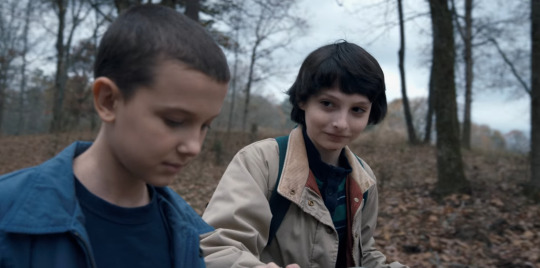

look. that's the same look. right?
let's take a closer look. to do that, i'm gonna have to zoom in a bit on the first one. because, as you can immediately see, the shots are slightly different. the first is a little farther away, showing both mike and el, walking next to each other, whereas the second is much more intimate, a closeup on mike's expression as he looks at will's face in the foreground. a minor but telling difference about the levels of emotional intimacy in each scene.
so, moving past that first element of contrast, let's look at each shot in full, because in both of these scenes, mike goes on a bit of a face journey before he gets to that final smiling expression, seen above.

personally, i think studying actors' body language and micro-expressions is inconclusive at best, but i won't deny that these look similar. however, it's pretty clear to me that they aren't the same.
toward el, i see confusion, intrigue, maybe pleasant surprise, followed by a glance down (to emotionally process and/or watch his step), and then a nervous but friendly smile.

toward will, i see awe, relief, and overwhelming affection, followed by a shy glance down and a slight schooling of his slack jawed expression into a warm smile.
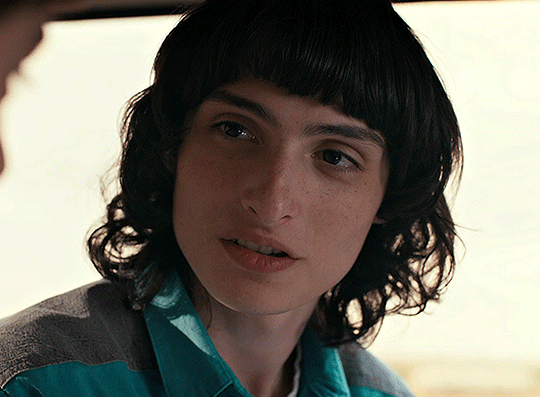
but, again, that's just my interpretation, and i can't say with any certainty what the intention of all of finn's micro-expressions are. but from my perspective, even a surface level viewing of these two expressions depicts a very different emotional experience. however: there's no denying the connection between these two scenes. they clearly mirror each other, just like a lot of things about mike's relationships with el and will mirror each other. i don't think that's an accident.
whatever you think his sexuality is, mike is undeniably in a romantic narrative with el. beginning in season one episode three, when the concept of their romantic relationship is introduced, the narrative arc mike and el share is heavily focused on that relationship. the first scene above actually happens in that same episode (s1e3), not coincidentally almost directly afterward. and the former scene, with mike, lucas, and dustin behind the baseball field, provides very interesting context for several reasons:
first: bear with me, because we're going back to look at the context behind this context. this is only episode three of the show, but already there's a lot going on, both in text and subtext.

and since we have the entirety of their relationship so far presented to us on screen, when lucas accuses mike of looking at el romantically, we're easily able to go back and figure out where he got that impression: we can examine every time lucas has seen mike look at el at all.
the first night, after finding el in the woods instead of will, and while insisting that the next day she'd be gone and they could focus on will again, mike's behavior is directly reminiscent of benny's. taking el in, and providing her with shelter, food, and clothing.
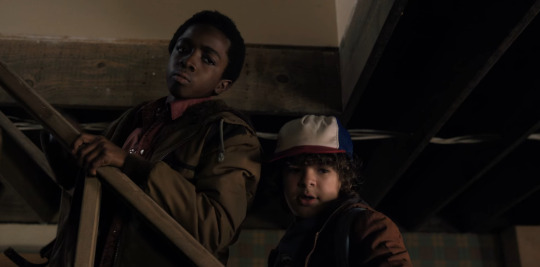
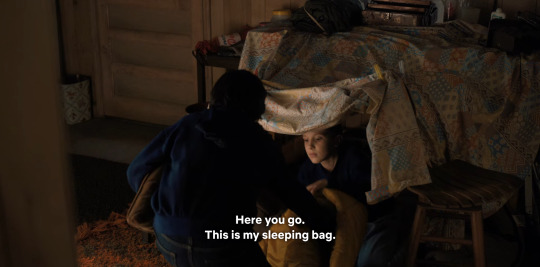
the next day, after learning that she's in danger and changing his mind about pawning her off on his mother, mike infers that she might know something about will. when lucas arrives, he exclaims that she recognized him and knew he was missing.
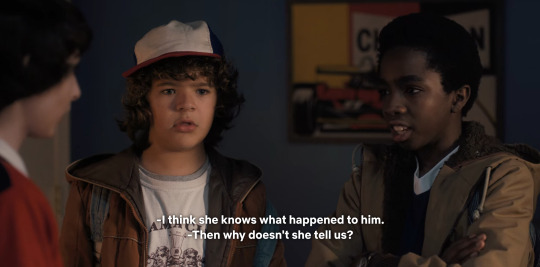
later, when lucas tells her that will is their friend, she asks what that means and mike explains. a friend...
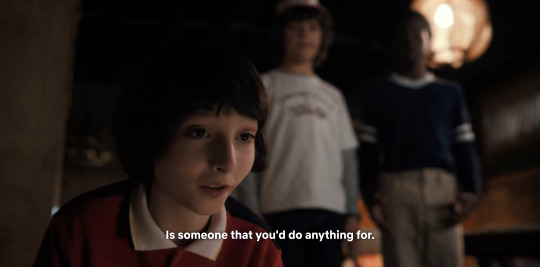
and then she displays that she might really be able to help them find will. and mike looks at her like this:
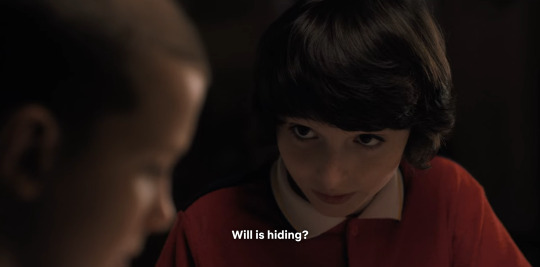
each and every one of these interactions is directly related to will. but lucas, through the omnipresent lens of heteronormativity that surrounds boys' interactions with girls (especially a group of boys who have no experience with girls... more on that in a bit), only seems to consider the fact that mike's behavior, which is undeniably about will, is being directed at el.
throughout season one (and beyond, in more subtle ways), will and el are repeatedly connected to each other through the trope of mistaken identity. will is abducted on the same night (and due to the same series of events) that el escapes the lab. hopper, in his investigation into will's disappearance, keeps running into clues about el. and mike, lucas, and dustin, sneaking out in episode one to search for will, find el instead.
later in the season, hopper eventually realizes the truth of his own more overt mistaken identity arc: while he was under the assumption that he'd been following will's trail, he'd actually been following el's. interestingly, the realization is triggered by one specific distinguishing difference, which tells him beyond a doubt that he's been looking for two different kids: their art.
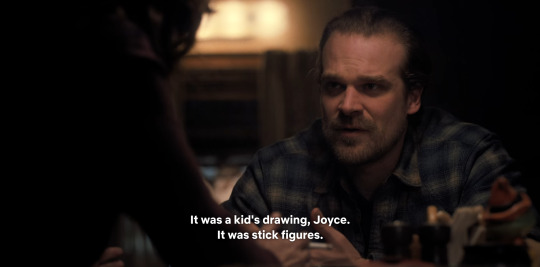
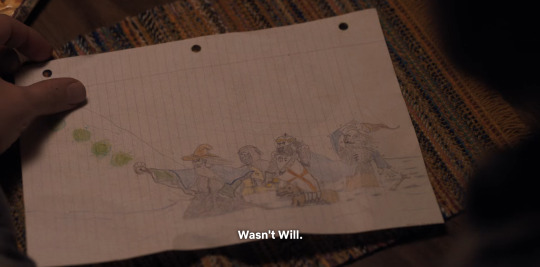
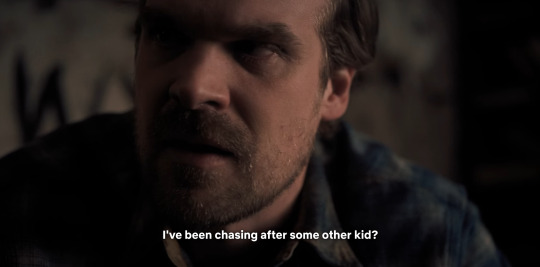
though much more subtle (aka hidden in the subtext), mike's arc with his feelings about will and el follows a very similar pattern. the main difference, though, is that in season one, the swapping of places is eventually reversed but never acknowledged as such, and mike ends season one with el now missing and will back in his life, but a lingering sense of something yet unresolved.
second: (i'm not going to deep dive into this one here, because it's a whole analysis in and of itself, but i need to mention it because it is relevant) this scene introduces the recurring motif of superheroes being directly connected to mike's feelings for el, which is an association we see follow them all the way into season four and become a defining metaphor for their incompatibility.

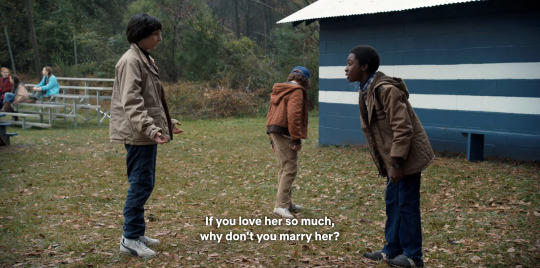
third: lucas is the character who first introduces mike's romantic feelings for el into the narrative. and instead of giving any indication that lucas' interpretation is correct, mike's reaction is... difficult to read. his response is immediately defensive, both verbally ("what are you talking about?" "shut up, lucas,") and physically (leaning away and shielding himself when lucas hugs him). we can infer from the original character descriptions why mike might be defensive about this subject:

obviously, this description is only a vague impression of what Mike Wheeler became, but it's clear that the core elements of his character outlined here did come to fruition on screen. here, mike's insecurity is linked both to the bullying he undergoes, and to his inexperience/ineptitude with girls. and it's presented as key to his character motivation (the original concept of his character arc put forth here is very straightforward: at the start, mike has insecurity centered around bullying and is romantically inexperienced. by the end, mike has courage against monsters and romantic experience.)
in any case, this scene is the first hint of this aspect of mike's character in the show itself (the earlier scene of bullying in the show focusing on mike consoling dustin over what he’s being bullied for (“i think it's kinda cool. it’s like you have superpowers or something!”)... see my last point here… mike holds the idea of superpowers in high regard, and they are consistently connected with his feelings about el. something about the mistaken identity through-line feels apt here: mike mistakes his feelings of admiration for el as feelings of romance.) in this scene, mike is confronted with both romance (in direct relation to himself for the first time in the show) and bullying.
but due to the way this is shot, it's impossible to get a read on what mike is truly feeling. it reminds me a lot of another scene, actually...

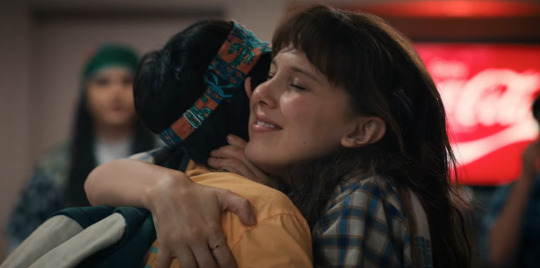
in both of these scenes, mike's genuine emotional reaction is hidden from us. in the first, lucas forcibly hugs him, teasing him about how much he "loves" el, and in effect introducing the idea of el as a romantic prospect to mike. in the second, el hugs mike tightly, her hand still around his neck from their kiss and his arm trapped in between them, similar to the way he shields himself from lucas. we're then shown that he's signed the card on the flowers squished between them "from, mike." hm. so... not love, as lucas suggests.
we come to learn over the course of season four that this is something mike is actively struggling with: his inability to "love" el in the way that she wants, expects, and deserves. this scene, introducing that season-long arc, conceals mike's true emotional state and motivations from us, again, mirroring the first introduction to their entire romantic plot line way back in season one.
(an aside: lucas' "if you love her so much, [then] why don't you marry her?" aka the inciting event of their romantic arc, is a based on a conditional statement with the hypothesis that mike loves el. as mr. clarke might posit (in, say, season one, episode one): what's the difference between an experiment and other forms of science investigation? ...well, an experiment is a controlled test of two or more variables against a hypothesis. does that remind you of anything happening in mike's romantic narrative? something about...... [murray voice] experimenting sexually?)
anyway. then, after extracting himself from el's embrace, mike finally drops his bag(gage) and opens his now empty arms to will, before preemptively cutting himself short with a punch to the shoulder.
...did someone say internalized homophobia?
and then immediately upon being introduced to argyle, mike is called out for his presentation here not being genuine. ("it's a shitty knock-off,"/"i really thought it was ocean pacific...") we're being told that something about mike's performance is not what it seems (and may even be a case of one thing being mistaken for something else).
and speaking of homophobia...
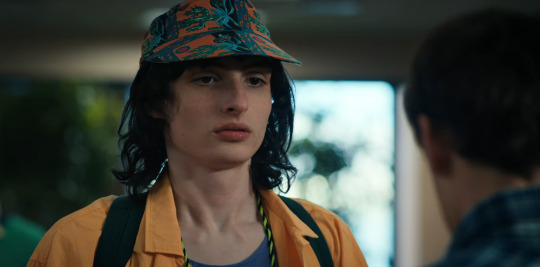
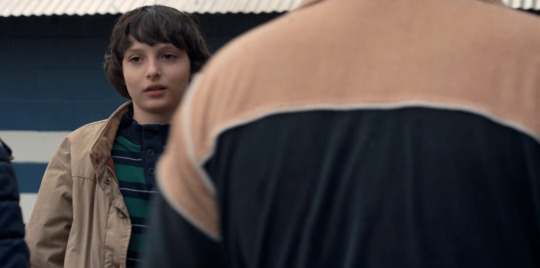
fourth (and finally): this scene, of lucas' teasing mike about his "love" for el, which i'll remind you again is tied directly to lucas mistaking mike's behavior regarding will as being solely about el, is quickly interrupted by an onslaught of homophobia, during which mike is specifically targeted (read: tripped) by the bullies.
the juxtaposition is immediate and obvious: mike's friends lovingly teasing him, even embracing him, over a crush on a girl vs. bullies maliciously taunting them about will being killed for being queer and then physically harming mike.
(there's also something to be said about the later scene in which these bullies force mike to drop his bike in the woods and chase him to the edge of the quarry, mirroring exactly how the cops assume will must have died... and, to be clear, i'm not saying that mike himself is being bullied for being queer in the way will was. no, mike's queerness is invisible to those around him in a way that will's isn't, so his relationship with it and the ways it affects him are hidden in subtext.)
which brings us directly to the following scene in the woods. el asks about mike's injury (sustained from the aforementioned bullying, thereby linking these two scenes even more concretely) and with a little prodding ("friends don't lie"), he opens up to her about what happened, and about being bullied at school. she listens, tells him she understands (this also follows her recent flashback of brenner's abuse in the lab), and they share a "cool," "cool," and a smile.
so... let's quickly jump over from here to the van scene with will. something similar, yet notably different, is happening in this scene, leading up to that infamous smile at the end. mike is sharing his insecurities with will now, but instead of will prodding him to open up, mike, prompted only by will's "she's gonna be okay," begins rambling so much about his insecurities (while speaking in superhero metaphors) that he eventually cuts himself off, saying it's "stupid." instead of letting him brush it off, will guesses exactly what mike is afraid of: "you're scared of losing her." he gives him The Painting (a symbol of his love for mike) and a long speech about feeling lost and different, while insisting upon mike's value (you're the heart, leading us, inspiring us, etc). and then they share a "yeah?" "yeah," and a smile.
so we can see the similarity in the way the shots are set up, the progression of the conversations, and mike's visible reactions. but we can also see distinct differences, all of which together inform a significant difference in emotional weight between these two scenes.
while mike's conversation in the woods with el takes place in the third episode of season one, at which point mike has known her for less than 48 hours, the van scene is in the second to last episode of season four, and is the fourth of five heart-to-hearts mike and will have this season alone (and following three previous seasons and beyond that years of close friendship). it is also arguably the climax of their shared arc this season. on the other hand, mike and el's season one moment is part of the introduction to their storyline, and the introduction to their romantic arc. in this moment in the woods, mike is looking at el romantically (did you think i was gonna argue that he isn't? because no, he definitely is). in fact, this is the beginning of mike's entire romantic arc, which sets out to address the foundational insecurity that is key to his character. we, as an audience, right alongside mike, have just been told (by lucas) that mike has romantic feelings for el. and then we are presented with this scene. we are supposed to view this as romantic. because mike is starting to view it as romantic.
had stranger things been one season long, then the climax of their romantic arc would have been the kiss they share in the cafeteria, followed by the denouement of el's symbolic death (the gay implications of which i could write another whole essay on...). but the end of season one was not the resolution of mike's full romantic arc. by the nature of the five act structure (which is what stranger things has, being five seasons), the entirety of season one serves as exposition for our full narrative. which means, in effect, that the entire arc of mike and el's season one relationship is there to serve as groundwork, a foundation for mike's complete five season arc. season one, starting from before he even meets el, all the way through to when he eventually kisses her and then loses her, is only act one of that arc. the first act of five act structure is when the driving conflict is presented. so in the context of the entire show, for us as the viewer, mike's narrative arc surrounding the romantic aspect of his insecurity begins with his season one "romance" with el.
and we know that this insecurity is an element of the full five-act narrative, rather than being presented and wrapped in the course of the mini "self contained" narrative of season one, because we can see plainly, three seasons later, particularly during mike's heart-to-hearts with will, that this insecurity has not yet been resolved. we know this, on a basic level, from having watched mike and el's relationship struggles progress, but it is still explicitly laid out for us in season four. and will is consistently the only person who genuinely hears mike out, encourages him to open up, and addresses his insecurities, instead of brushing him off, like most other people in his life (including will at some points) have done. will understands him in a way el only claimed to in season one.
looking back to the character outline: mike has now "kiss[ed] a girl" and even "had a girlfriend" and still hasn't resolved his insecurities even remotely. in fact, after the first season arc wraps up, this romantic relationship becomes the main source of that insecurity. his difficulty navigating a real romantic relationship with el is the basis of their arc in season three. and by season four, mike is consciously struggling with being unable to tell el that he loves her. despite will's reassurances that things will be okay (which stack onto lucas' constant relationship advice in season three), mike keeps circling back around to it. because he can't move forward on the path he is on.
he has reached a point of no return, like a “fight you can’t come back from.” he is unable to find the security he is searching for in his romantic relationship with el... and this is where we arrive back at the van scene with will.
if the scene in the woods marks the beginning of the introduction of mike's romantic arc, then the scene in the van marks the beginning of the conclusion of mike's romantic arc. if the introduction of his romantic arc (season one) presents his insecurity, then the natural conclusion of that arc (season five) is security. throughout season four, mike lays out for will the insecurity that his relationship with el still brings him. he is unable to find that security with el, and, in the van scene, finds it with will instead.
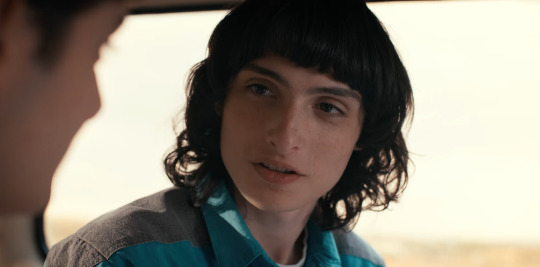
or, should i say, begins the journey to finding it. because, especially after the lie that brings them into that moment, and then traumatic pizza dough freezer incident, we're still at the beginning of the conclusion. there's still a lot to resolve, but season four (alongside mike, who now understands what he's been going through) finally began moving the subtext of mike's arc into the actual text. and this moment indicates that season five will take that next step to fully, textually, actualizing it.
so, getting back to the parallel we're looking at here: each of these scenes is a catalyzing moment in mike's romantic arc. in season one, when lucas suggests that mike has a crush on el, and then what follows is a conversation with el where she is (to quote lucas) "not grossed out" by him, he actively begins his journey toward resolving this character motivating insecurity. he looks at el and he sees the possibility of romance.
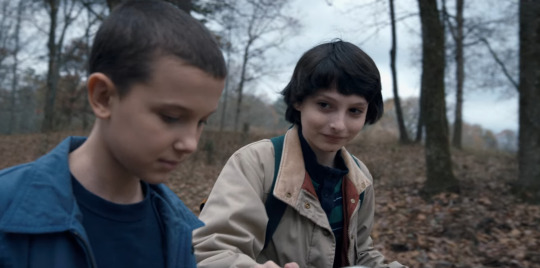
and just look at him. he looks excited. hopeful. a little nervous. but... i want to remind you again: mike has known el for less than 48 hours at this point. this is the first conversation they've had in which they've related to each other as equals. for their entire relationship before this and afterward, outside of their romantic interactions (and also. often. disturbingly. concurrent with their romantic interactions...), mike's role has been as el's protector, a makeshift father figure, the elliot to her E.T. here, though, el tells mike that she understands him.
in season one, mike is twelve years old (read: pre-pubescent). he has no personal understanding of or experience with romance. dustin starts to comment in s1e2, "you're letting a girl...?" and ted later scoffs "our son with a girl?" and outside of the queer coding, what we can take from both of these (which draw back to the original character description) is that mike has no experience with girls whatsoever. (outside of, you know. family. but that's not what this post is about.)
and again, this scene happens almost directly after lucas first introduces the idea of romance between them, both to the narrative, and to mike himself, who, very significantly, up until this point, has shown no romantic interest in el. the sequence of these events is not a coincidence. 1. lucas assumes mike has romantic feelings for el. 2. el and mike have a moment of personal connection and understanding 3. mike "boys only" wheeler puts these two together and assumes the connection between them must be romance. but the expression on mike's face here isn't a representation of already existing romantic feelings. there's no basis for those. again, this moment represents for mike the potential for romance.
which... makes his expression in the van scene hit even harder. because unlike el, will isn't a stranger he barely knows, but rather his best friend of ten years. and it isn't lucas telling mike how mike feels. it's will professing his own feelings about mike, in direct response to mike's self-professed insecurities. (ding ding ding, are your alarm bells going off?) mike's expression at the end of this scene, if we're viewing it as a reprise of his season one expression, is a representation of hope for his romantic future. but this time, heading into the resolution of mike's romantic arc, with all of the knowledge and context we (and mike) have gained over the course of the past four seasons, it's directed at will.
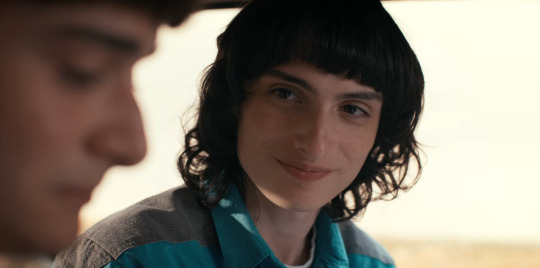
ok. so. with the basic connection between these two scenes established, i'm gonna move a little bit sideways here. at the end of their romantic arc in season one, el disappears from mike's life and will reappears in it, effectively swapping their places (remember that we've been dealing with the mistaken identity trope between these two), and leaving the question of mike's romantic security glaringly unresolved.
and we know why - this is a five act narrative we're watching - but just within the context of the season one arc... the climactic moment of mike finally asking the girl to be his sister kissing the girl was preceded by her locating will in the upside down (leading to his rescue) and followed by a resolution in which she disappeared... and will took her place. at the end of the season, mike is left in the same place he started: playing games in his basement with will, his first attempt to resolve his arc of romantic insecurity, with el, ultimately ending in tragedy.
after season one, this arc picks up again, but this time will is the one present in mike's life. and mike's behaviors toward el in season one, during which they were undergoing a romantic story arc, begin showing up again in his behavior toward will. but unlike with el, mike's particular (read: romantic) behavior toward will happens without outside intervention, and in fact, often in spite of outside intervention. now, this isn't to say that all of mike's behavior with el was a result of others' influence. when el reveals to mike that she is on the run from "bad people," mike is immediately protective and caring toward her. however, as i've already explained, this caring behavior (which, again, we know right off the bat is not romantic because it directly mirrors the way both benny and hopper care for her) doesn't turn into romantic behavior until lucas introduces that idea.
on the opposite side of the spectrum, right from episode one of season one, mike's behavior toward will is fully self motivated, even in the face of opposition.
and as we move through season one and beyond, we can see that mike continues to rely on constant guidance in the way he cares about el (particularly and most consistently from lucas).
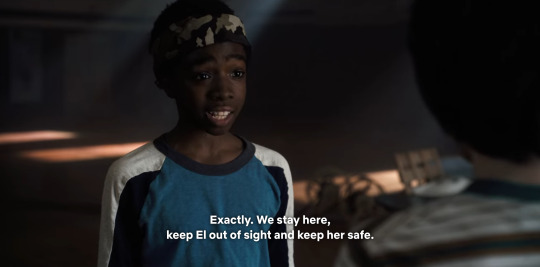


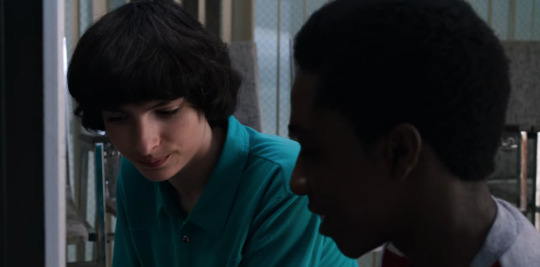
stranger things is, at it's horror filled core, a coming of age tale. like many of our other characters, mike's full character arc, romantic and otherwise, is about self-actualization. from the very conception of the show, his insecurity is presented as a central character flaw to overcome, while also being directly linked with his romantic fulfillment. the overcoming of this fatal flaw, the resolution of his romantic arc, and his final achievement of self-actualization are all inextricably intertwined.
the reprisal of this specific expression of romantic hope as we enter the end of mike's romantic arc is not an indication that mike is in the same place emotionally at the end of season four as he was at the beginning of season one, just with a different person now. instead, it is an indication of his romantic arc coming full circle. mike began in a position of hope for his romantic future with el, only to have the actualization of that hope (their romantic relationship) gradually degrade his romantic fulfillment and self-esteem. the longer mike and el are together, and the more serious their romantic relationship becomes, the worse mike's insecurities become. this is, i would argue, directly related to the fact that mike's pursuit of a romantic relationship with el is not due to his own genuine desire, but instead a combined result of heteronormativity (lucas assuming mike's feelings for el to be romantic), compulsive heterosexuality (mike's subsequent assumption that his feelings for el must be romantic), forced conformity (mike's attempt to resolve his insecurities firmly within these heteronormative boundaries, under the assumption that a rejection of these boundaries is unacceptable), and the trope of mistaken identity that has been following will and el since season one.
and of course i don't know with any concrete certainty what season five will contain, but based on the narrative so far, and optimistically expecting a satisfying resolution to his character arc, the actualization of his romantic hope regarding will is going to lead to true romantic fulfillment and coincide with his self-actualization (a big part of which is coming to terms with his sexuality).
now, i'm not going to conclude this whole analysis by saying, "and that's why mike is gay!" because while i think this all is a good indication of that, based on all of the context and my impression that this narrative is being presented in a way that focuses on the subtext and deeper symbolism of each of these relationships rather than being a case of specifically el vs. will, you might still have a different interpretation than me. that's fine. however, i am going to end by insisting (me when i argue with the wall), based on everything i've laid out, that this parallel and others like it (ie parallels between byler & miIeven's romantic arcs) are not evidence of mike's feelings, specifically whether they are genuinely romantic or not. this parallel serves as a narrative device in his romantic character arc... the conclusion of which is mike realizing and coming to terms with the fact that he is actually in love with will, and not el.
just to be very clear, i'm not saying these parallels alone are proof against mike being bisexual, but i am saying that they are not evidence in support of his being bisexual. again: they do not indicate that mike is romantically attracted to el. what they indicate is that will and el are foils in mike's romantic arc.
before i finish, i want to address a couple misconceptions:
1. the fact that mike actively and willingly participates in a romantic relationship with a woman means he can’t be gay. this is straight up homophobia. gold star bullshit. no.
2. mike and el being presented in a romantic light means that they have genuine romantic feelings for each other. this is a misconception of the way narrative tools are used to tell a story. going right back to my first point: it is an irrefutable fact that many gay people have romantic relationships with the people of different genders (read “the opposite sex”) before they come out/realize their true sexuality. it is also a fact that many of these gay people fully believe their feelings to be genuinely romantic before realizing that they are not. as i've already gone over, mike is twelve years old when his romantic arc begins. on the surface, his relationship with el is presented as romantic. he participates in (and even initiates) romantic behaviors because he believes that his feelings for el are romantic. in seasons one and two, mike is one of our main POV characters. we can see a romantic tilt to the way some of their scenes are shot because, to mike, while they are happening, they are romantic (keeping in mind what i said before about mike having no experience and therefore no personal knowledge informing his perspective, AND keeping in mind that many of these on-the-surface "romantic" scenes are also consistently subtextually linked (read: paralleled) to familial relationships for both of them... and i haven't even touched the cultural context surrounding homosexuality in 80's. there's so much nuance informing the way this story is being told). and we, as the audience, are supposed to read them as romantic on first viewing, because otherwise the season five plot twist, revealing the truth of mike's feelings, would not work.
it is not a coincidence that the active degradation of their romantic relationship (outside of all of the other context, parallels, symbolism, family coding, etc, that are there to hint along the way that things are not as they might seem) begins full force in season three, at the exact point when the two actually enter a real relationship for the first time, and also when our characters are entering puberty, the time during which a person's sexuality (in a general sense, but also in regard to sexual orientation) begins to fully emerge. after his season one arc with el, mike underwent another season-long romantic arc: this time, with will. it's more subtle, because (i believe) mike doesn't realize yet that it's romantic, but it's there. then at the end of season two, mike makes a choice: he encourages will to dance with a girl and he dances with el, re-writing their tragic ending from season one, but now leaving his romantic arc with will frustratingly unresolved, again mirroring the sense of unresolution from season one: mike has swapped out the end of each romantic arc with the wrong love interest.
and then in season three, now having had the experience of both romantic arcs, and now, for the first time, with both will and el right there beside him, all we can see anymore is the overt contrast between the two relationships, depicted most blatantly through the same type of visual and narrative "parallel" we've been looking at here.
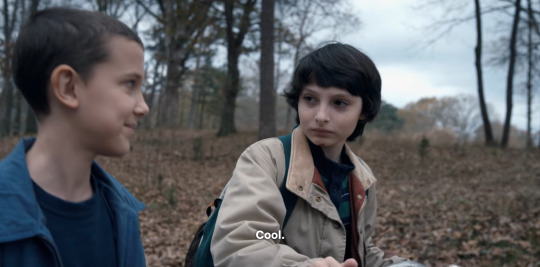
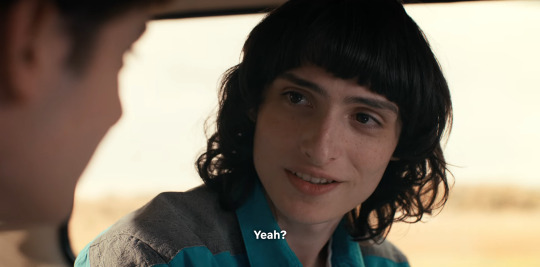
but at the end of this season, instead of making a choice, mike's choice is made for him. he has a romantic moment with will, and then el kisses him, confusing the resolution of these two romantic arcs once again.
mike's season four arc closely mirrors his season one arc (searching for one love interest with the other by his side, mistaken identity trope abound), but with important distinctions: 1. mike is a little older, a lot more experienced, and has a better understanding of both the context of romantic relationships and the scope of his feelings for both el and will. and 2. mike's only real guidance in season four comes from will, and he doesn't simply listen and act based on will's advice, as he did with lucas' in seasons 1&3. now, he fully engages with will's input, pushing back against it when he doesn't agree, and accepting it when he can acknowledge its truth (up until, of course, our fourth (and hopefully final) tragic, incorrectly resolved ending). mike is finally taking control of his romantic narrative in a way he hasn't previously, and the direction it's heading in now is toward security, self-actualization, and will.
so the point of all of this is: nothing is as simple or straightforward as it may seem on the surface. the narrative has always been deeply complex and layered with subtext and symbolism. and most of all, when interpreting the meaning of anything presented directly to us on screen, context matters.
also uh. yeah, mike gay
#byler#mikesbasementbeets posts#parallels are there to be noticed. but that should be where the analysis begins. not where it ends.#this got kinda long i just wanted to be really thorough bc this kind of 'parallel = 1:1 similarity' thinking is way too prevalent#this is less an analysis and more me explaining the plot of the show but. sometimes it feels like it needs to be explained lmao#yes i lied about the ending but when you eliminate the only claim negating that conclusion....#that's. i mean that's the conclusion.#(btw the difference between comparative and experimental investigations is that in an experiment one of the variables is fixed.#something to think about)#mike wheeler
775 notes
·
View notes
Text
Efficient Writing At Its Best
Is it me, or is there a noticeable jump in quality in No Princess Left Behind? As in, the animation budget seems to double between episodes, the cinematography is stellar, the humour is incredible. And the writing itself becomes so much more enthralling.
What gets me about this jump is that She Ra and the Princesses of Power was already a fantastic show. Each element I mentioned above is already firing on all cylinders. You would think that this show cannot improve any further, but in this episode it does.
Promise is lauded as some of the best She-Ra has to offer. And don't worry, I will get there. But No Princess Left Behind is my favourite episode of the show by far and one of my favourite episodes of television. This is the episode She Ra stops being merely an incredibly well-made show, and starts to become art.
Let me explain.
SPOILERS AHEAD
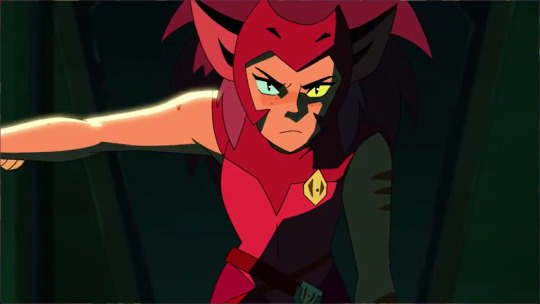
First up, format. This episode is a prison break and both a condensed monomyth and a miniaturised tragedy. None of these things make it great on their own, that's not how writing works. But they are written with incredible nuance derived from character, setting, and the intersections of those tropes.

A prison break is a self-explanatory story structure. A character is imprisoned and either doesn't want to be or has allies who don't want them to be. In the case of the external help variation, as with this episode, the plot functions as a medicine journey with the object of significance being the ally on the inside. (A medicine journey is just a journey to a place to retrieve a thing).
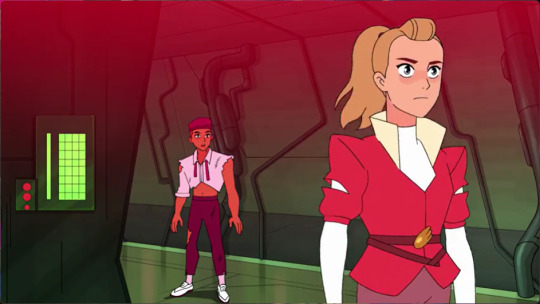
Monomyth is another term for the Hero's Journey. And there are two things about this that need to be understood: The Hero's journey is a set of guidelines, and the Hero's Journey is fluid. By which I mean, the format of the monomyth isn't set in stone, and if a story doesn't follow the specific set of rules you have found, that's not a fault.
In essence, the Monomyth is a set of common events that link multiple stories. Originally proposed in Joseph Campbell's A Hero With A Thousand Faces, the format has been changed over time through interpretation and through people leaving out Campbell's... biases (Misogynistic is an understatement for this guy). The form I am most aware of includes elements such as crossing the threshold, the darkest hour, and the metaphorical death and rebirth, all of which this episode hits in quick succession. If you want more details about the monomyth, I advise reading Campbell's book, or this article by Owlcation. TedEd also has a neat video on the subject.

A tragedy is the most well-known story type. Or rather, you say tragedy, and people generally get what you are talking about. It's a story with a sad ending. But there is more complication than that. Beginning in Ancient Greece, a tragedy is a way of experiencing powerful emotions in a safe environment. Loss, pain, hope, joy. A tragedy is a rollercoaster and is an incredibly good way of achieving that effect. To the point where stories that aren't tragedies (Like She-Ra) are frequently written as them and subverted at the last possible moment. OSP has a video going into detail, but in the interest of this analysis being shorter than a Tolstoy book, the words to understand are these:
Hamartia - Fatal flaw
Peripetea - Reversal of fortune
Catharsis - Emotional release
Bear these in mind because these are situational, and I will be talking about how in a moment. The point is this episode is incredibly efficient at showing each character's strengths and weaknesses and having them affect the plot. Each character has some moments to shine, and that final gut punch is caused by the characters' mistakes. Thats why it hurts, because it was both unlucky and inevitable.
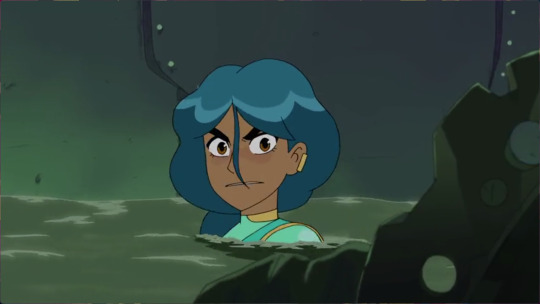
Mermista and Sea Hawk steal the show for me, for completely opposite reasons.
I have always believed, somewhat falsely, that the most well written scenes are those with less dialogue, because the rest of the acting can speak for itself. The minour acting and surroundings can shine if there is less dialogue to distract. Mermista is an example of this, but also an example of why this belief is wrong.
Mermista is the queen of subtlety, with so much emotion and meaning being portrayed by so little. She is exaggerated, sure, but she is a lot more subdued than the entire rest of the cast. What she does have, is expression. In the sewer scene, her head is the only thing visible, and she has more character on display in twenty-two seconds than Swiftwind has in the whole series. She doesn't even speak.
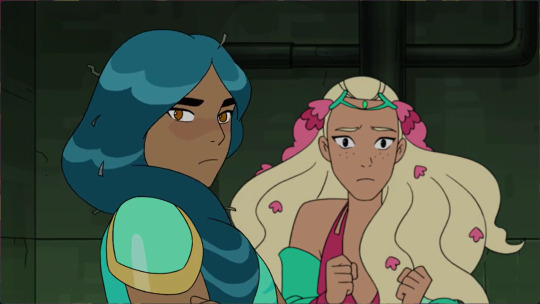
But when Mermista does speak, there is something fascinating happening here. Mermista's lines are saying a completely different thing to her animation, actions, and even the inflection of how those lines are delivered. Mermista goes out of her way to put up a facade of not caring, but she is remarkably affected by her surroundings and the people around her.

For example, despite herself, she grows attached to Entrapta, and gets excited when they work as a team. But I find this gesture so much more revealing. She tears up. But instead of crying, she quietly turns away and dries them. Mermista's Hamartia is also her greatest strength, her distance. She is pragmatic, but she pushes herself too far away to help.
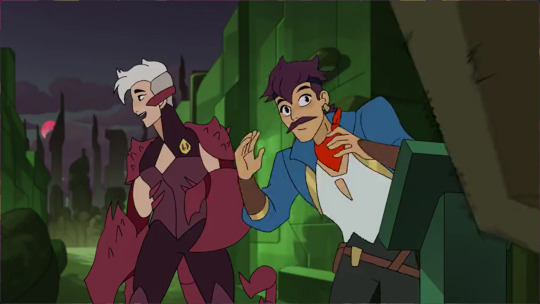
Meanwhile Sea Hawk is a TTRPG bard. This isn't even subtle.
For those who don't know, in DnD and Pathfinder, a bard is a charisma-based class that plays support most of the time (although you can build it in whatever way you want, this is how the class is designed). This means that they often end up as the party face and the glue of the group. There is a prominent live show in which a Bard leaves the party, and it shows off my point exactly.
Sea Hawk is easily the most charismatic character on the group, a fact he uses in a really interesting way. For one, he's distracting. His fast talking keeps Scorpia from being a problem for the group, and in every fight he is in in this episode, his primary role is to distract or annoy his opponents. He doesn't deal much damage, but he keeps himself as a piece on the board that gets on people's nerves and gets them to make mistakes.

Sea Hawk's constant babble is doing another thing for the group. He's reassuring and comforting. His number one priority at all times (successfully or not), is to keep everyone's spirits up. Sea Hawk is a master of inspiring. And would you look at that, DnD and Pathfinder have that as a core ability (Bardic Inspiration and Inspiring Performance respectively).
So, what is Sea Hawk's weakness? His optimism. I don't mean this as "optimism is foolish", I mean that Sea Hawk's hamartia is, much like Mermista, his greatest strength. Sea Hawk is always looking forwards, always keeping the group moving. When someone stops, it doesn't occur to him to look back until it is too late.
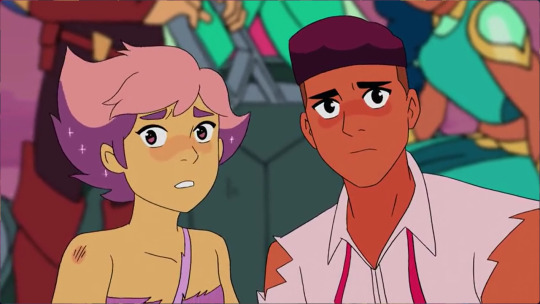
Glimmer and Bow are similar characters to each other, and it is in how they react to stress that that is shown. Both are resilient, but where one is resourceful, the other is relentless.
Bow is a simple character, in comparison to everyone else. Psychologically and physically. He doesn't have powers that can be restricted or that can get him out of trouble. What he does have, is his mind. Bow is clever and resourceful, and he works out a way of getting the right information while imprisoned so that the group doesn't have to work on that later.

Bow thinks big picture, once again his greatest strength and greatest weakness. He can strategize really well, but he doesn't expect the little things. Like Adora's surrender, or like the tiny detail that he overlooks: Entrapta likes robots. It's so small and so natural to him that he takes it for granted.

Glimmer's fatal flaw is obvious already. It's her stubbornness that got everyone into this situation, and that directly causes the end result. This is Glimmer's fault. But Glimmer's stubbornness isn't always a bad thing.
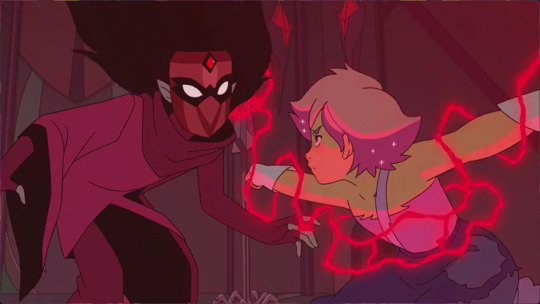
"It's a shame the toll this rebellion has taken on your family. First you loose your father and now..."
"She-Ra will stop you."
"There is no She-Ra!"
Shadow Weaver is a character who specialises in messing with people's minds. She enjoys control, and routinely underestimates the power of determination. To her all those around her are weak willed. But say what you want about Glimmer, the one thing she is not, is weak willed.
I love the line above because it is the first time anyone has managed to actually annoy Shadow Weaver. By this, I don't mean the same type of annoyance as Catra is to her, because I don't think Shadow Weaver cares about her enough to be truly angry. What Glimmer does here is win on Shadow Weaver's home turf.
Shadow Weaver tries to demoralise, and Glimmer blinks away tears, looks her square in the face, and remains stalwart. That's why I think Shadow Weaver shouts here, she's furious, and she can keep posturing, but Glimmer has won this little exchange.
Even with the reveal of the sword, I think its clear just how much Shadow Weaver is rattled, and I think this little exchange is the reason for her actions later on in the series.
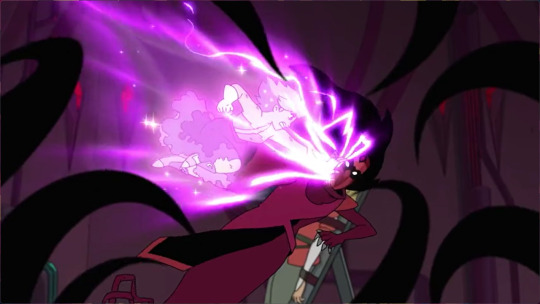
This is also on display here, as once again, Glimmer's raw determination and stubbornness blindsides Shadow Weaver, and it's telling what provoked this. Glimmer is protective of her friends first and foremost. And here, Shadow Weaver pushes too far, and the power of friendship prevails.
It's a minour moment of the theme for the rest of the series. Love, whether romantic or platonic, will overpower anything.
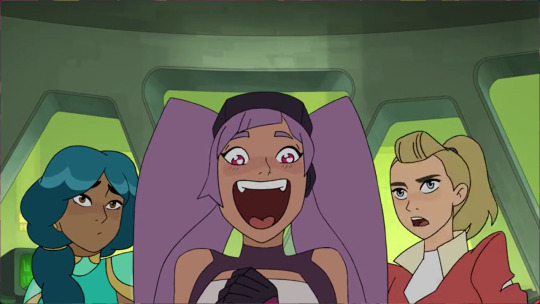
And finally, there is Entrapta. I don't think I need to explain what her strengths and weaknesses are. She's not hiding either.
What's important to note about Entrapta is that she is the convergence of the plot threads I mentioned earlier. The tragedy is her story, and this episode focuses in on that.

Her death scene is so powerful because it is so unfair, and so inevitable. It's quick, and unavoidable in the moment. Thie is the moment when the cost of this war finally sinks in. Yes, things happen later on, but it cannot undermine the gut punch that is this scene, and the final few moments of this episode.
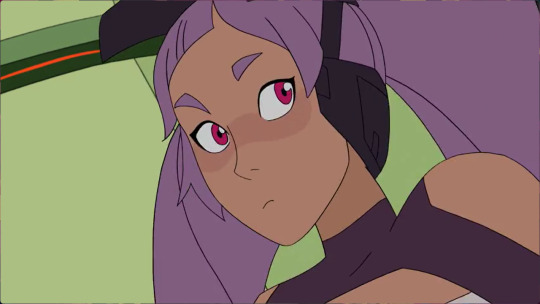
Peripetia is the reversal of fortune, it is the moment when all of the Hamartia comes crashing down and everything thereafter, and the tone changes. In Romeo and Juliet, this is the death of Tybalt (Spoilers).
Here, the Peripetia is the moment when Emily gets stuck, and those flames. It's the look in everyone's face as they realise what has happened and that brief shot of Entrapta's expression before. And it is that infernal siren.
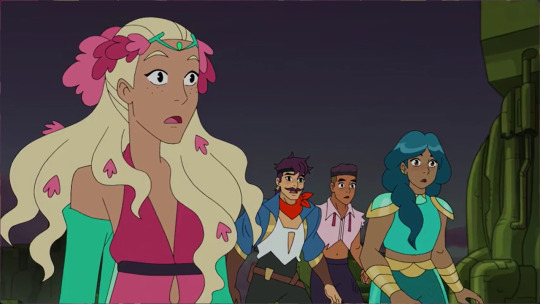
Catharsis meanwhile is the moment of relief, or setting out those emotions. Catharsis is technically not a part of the story, it happens when you stop watching and reflect.
But this episode offers you time to wind down. That brief shot of She-Ra turning back into Adora is powerful not just because of the music, but also because of how empty it is. There is no closure here, and the audience doesn't get it either. The episode ends on this:
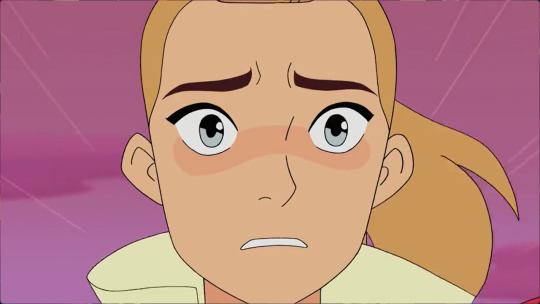
Final Thoughts
I didn't even have time to talk about Catra. She doesn't really do much here, but that scene with the sword is a nice bait and switch. Shadow Weaver is evil, all the characters are at their best and their worst simultaneously and I think that is quite cool.
Oh, and Perfuma. She has an extremely restricted worldview of what teamwork should look like, and Entrapta doesn't fit into that, hence the conflict. I think Perfuma learns to change slightly but doesn't get much time to do so in this episode.
Next week I'll be taking a look at The Beacon, so stick around if that interests you.
Previous - Next
#rants#literary analysis#literature analysis#character analysis#what's so special about...?#she ra and the princesses of power#she ra glimmer#she ra#she ra spop#she ra adora#spop#shadow weaver#glimmer#best friend squad#she ra bow#she ra mermista#she ra sea hawk#she ra entrapta
72 notes
·
View notes
Text
Young Royals and the three act structure, Part two
Here we go again! Last time we spoke about how season one is constructed within the three-act structure. If you haven’t read the previous post I’d recommend you do so, because I’m not gonna explain each plot point again. Now we shall look at how this applies to the rest of the show, and based on that make a small prediction about season three.
So now that we’re all up to speed, let’s get to it!
I wanna take a moment first to consider Wille’s Want vs Need in regard to season two. The Want hasn’t really changed - He still wants to be with Simon. Although we are now aware of his Need, because of how the previous season ended, his struggle now is more about how to get there. Essentially, coming to terms with taking accountability and committing to his values. Consider where he’s at the start of the season, compared to the end. In episode one he calls his mother and literally blames her and the court for everything. Missing the point that it was his own lack of communication that drove Simon away from him in the first place. He’s not ready to take accountability yet. That’s why he can’t have what he wants. In the end though, in episode six, that’s exactly what he does. He admits he was in the video with Simon, to correct what he did wrong. The emotional journey he’s been through this season pushes him to actively make decisions based on his own beliefs, not letting the crown manipulate him anymore. Wille has become fully aware of what he Needs.
We continue our structure analysis with season two. And I gotta be honest for a second, I struggled a bit identifying some of these beats. They’re not as grand as they were in the previous season, making the structure a bit less obvious. The way I see it, the second act this time around is veeery long. But once again, if you disagree with me, let’s chat!
Act 1
Act tension - Can Wille and Simon resume their relationship?
Sequence 1
Set up/Hook - Since this is season two, we already know most of the characters and there’s no need to go deep about what is plaguing Wilhelm, we know what happened last season. But when we catch up with him, it’s clear he’s had a terrible Christmas. He’s sad and alone in the castle, doesn’t speak to his mother, and is very angry at August. Then he returns to Hillerska.
Sequence tension - What’s gonna happen when Wille and Simon reunite?
Point of attack - Wille is eager to be around Simon again, but Simon is trying to avoid him and even asks for space.
Inciting incident - Wille finds out about Simon’s date with Marcus.
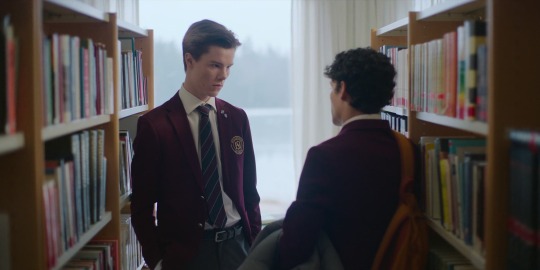
Sequence 2
Sequence tension - What is Wille gonna do with this new information?
Things are moving rather quickly here because again, this is the sequel, there’s no need to linger on the set up. So we are immediately faced with the first major plot point, the Lock-in - Wille calls the royal court and blames them for everything that’s gone wrong so far. He also makes the decision to actively fight them, by threatening to renounce the crown. This also establishes the royal court as the main antagonist for this season. August is still an antagonist, but no longer the main one. The main tension is also established.

Act 2
Act tension - How will he win Simon back?
Sequence 3
The protagonist starts this sequence having learned something new - Simon is making attempts to move on. Wille responds with petty anger. Then we get a pinch point - Jan-Olof shows up to remove Wille from Hillerska. Demonstrating the royal court's power.
Sequence tension - Can Wille stand up for himself against the crown?
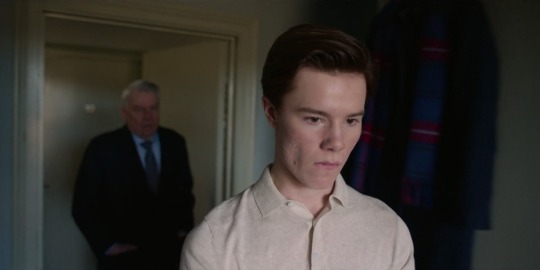
Sequence 4
The build-up towards the midpoint - Felice advises Wille to be around Simon as much as possible, to keep trying, and that he does. Like bargaining with Simon about having a secret relationship, helping Simon get a spot on the rowing team, and confronting him about his relationship with Marcus.
Sequence tension - Is Simon actually moving on?
And here comes the dreaded midpoint once again - Wille sees Simon and Marcus kiss. He now believes he’s lost Simon forever. What we could call “A false defeat”. This changes his aim from winning Simon back, to attempting to move on himself.

Sequence 5
Wille is trying to adjust to this new reality where he can no longer hope for Simon to come back to him. We could identify two pinch points here. One is the locker room fight, where Simon admits he can’t accept Wille's title. And the other is when Simon shows up at the ball with Marcus. Both of these remind Wille of the fact that he can’t be with Simon.
Sequence tension - Can Wille let Simon go?
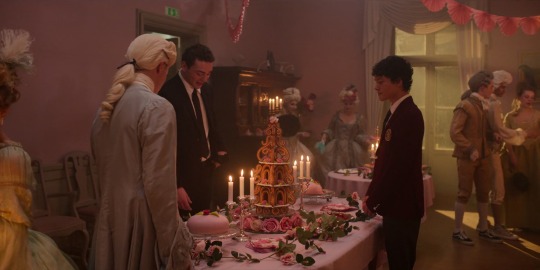
Again, some subplots advance here - Sara and August’s relationship intensifies.
Sequence 6
Starting with a plot point, a moment of reflection for our protagonist - Despite Wille’s attempts to let go, Simon runs after him at the ball. They end up kissing.
Sequence tension - They still love each other!
Wille is overjoyed by this turn of events, and for a moment believes that they can be together again.
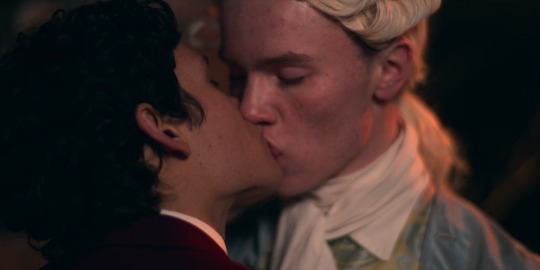
Sequence 7
Just like last time, Young Royals drags out the drama by adding an extra sequence here. A pinch point - Another reminder of the royal court's power. Kristina telling Wilhelm that August is next in line to the throne after him. Their argument in the music room could also be accounted for here.
Sequence tension - Wille is starting to realise how much his title affects Simon.
Wille’s offer to give up the crown could be more considered as a character-building moment, rather than a plot point. And Simon’s decision after this is more of a plot point in his own storyline.
The crisis that serves as build-up to act three - August threatens to report Simon for the drugs, if he reports August for the video. Wille reacts very strongly and takes it as a personal attack.
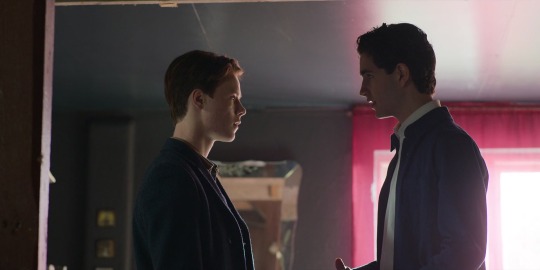
The end of act two, where the protagonist faces their biggest challenge yet - The aftermath of the field scene. Wille is alone again, Simon isn’t talking to him, and his title has badly hurt Simon once again. On top of all this, he has to do the speech.
Act 3
Act tension - Can Wille do the speech?
Sequence 8
Here the protagonist will make a big decision - Though perhaps is more Simon making the decision, to have a secret relationship.
Then we have the last major plot point, the twist - Despite the fact that Wille absolutely does not want to do the speech, he does it anyway, because he can’t let August be rewarded.
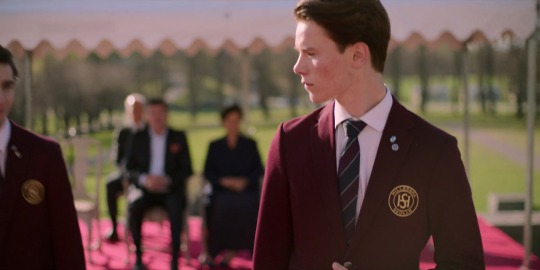
Sequence 9
Sequence tension - What is he gonna say in this speech?
The climax - Wille stops, considering the contents of the speech, and disagrees with it. He decides to admit it was him in the video.
Resolution - The smile they share I guess? But it’s still an open ending since this monumental decision leaves us with many question marks. Preparation for season 3.
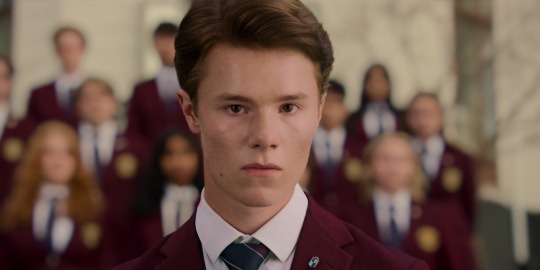
The show obviously consists of so much more than just these beats, like subplots and character-building moments. The purpose of these things should be to strengthen the characters, as well as add more depth to the main plot. Take our beloved fish scene as an example, it doesn’t really do much to advance the plot. But it’s a very good moment for solidifying Wille and Simon’s relationship! Which is important to keep us, the audience, invested in their story.
Subplots are quite interesting and tricky to get right. They tend to follow the same structure as the main plot. It’s also common for subplots to cross paths with the main plot as well, and sometimes even fundamentally affect it. However, since the main plot should always focus on developing the protagonist, you shouldn’t let any of the other character’s arcs hijack it. But you also generally don’t wanna keep the two narratives completely separate, because then the subplot might end up feeling forced and meaningless. A great example from Young Royals is the drug plotline between Simon and August. Let’s break it down real quick.
Act 1 - the deal
Set up/Hook - August approaches Simon. Clearly, they are not friends.
Inciting incident - August asks Simon to get booze for him.
Lock in - Even though Simon initially declined the offer, he eventually agrees to help August.
Act 2 - the money issues
Pinch point - August returns and now asks for drugs, despite being late with the payment.
Midpoint - Simon learns August can’t pay him back because August is broke.
Pinch point - Simon gives August more drugs to sell, so he may pay him back.
Crisis - August threatens to frame Simon for the drugs after the party. (The plot lines cross and affect each other)
Act 3 - the threat
Climax - Wille manages to convince the others to frame Alexander instead.
Resolution - Simon is safe (for now)
The reason why I don’t account for Simon going to see his father here is because I’d argue that them reconnecting is its own subplot, more related to Simons relationship with Sara, than it is to the August situation. It’s also an unresolved plot line still. Micke showing up at Lucia I suspect to only be their crisis point, or maybe even midpoint? Depending on how the rest of it plays out in season three of course.
Another neat trick writers may use with their subplots, is to parallel the main plot, either to highlight the themes of the story, or to explore alternative outcomes. For example, the Sara and August plotline at times resembles Wille and Simon’s plot, for very good reasons. Like how August and Wille are from similar backgrounds, yet they’re very different people. Especially at the end of season two. By that point the emotional journey August has been on, falling in love with Sara and reflecting on his wrongdoings, you’d assume he would have learned something or displayed some kind of character growth. But nope. Instead, he doubles down and causes further intentional harm to the people he’s already hurt. While Wille, in the same episode actively works to redeem himself to Simon. This is meant to strengthen Wille’s position as the protagonist we should root for, by comparing him to August, who remains to be an awful person. So even though it may feel like season two is giving more screen time to the secondary characters, that still has a purpose for the overall narrative.
Young Royals in general like to use their secondary characters to highlight the overall theme of the show. As @darktwistedgenderplural pointed out to me, widening the view of Wille’s Want vs Need to the want of being loved for who you are, and the need to be your most authentic self, we find that the same principle can be applied to all the five main characters. Despite all their journeys being unique, their wants and needs remain universal. They are all there to strengthen the theme of the show.
So what was the point of all this rambling? I don’t think it’s a coincidence that the story consists of exactly three seasons. The way I see it, since the three-act structure can be found in every element of this show, each season is also meant to represent one of the acts. Season one is the set up, season two is the confrontation, and season three will be the resolution. If we try to map out the entire show that we have so far in the structure format, you can quite quickly find the pattern.
Season 1
Set up - Wille is sent to Hillerska where he meets Simon and falls in love.
Inciting incident - The video is released.
Lock-in - Wille does the statement and Simon breaks up with him.
Season 2
Pinch point - The royal court proves to be a major obstacle to Wille getting what he wants.
Midpoint - Wille and Simon kiss at the Valentine’s ball, proving they still have feelings for each other.
Pinch point - The royal court is still trying to manipulate him, making him do the speech.
Moment of reflection - Wille considers how much his title affects Simon and chooses to come out.
My theory is that at the start of season three, we’ll get to the Crisis point of the over-arcing plot. Where our protagonist will face their biggest challenge yet and be at their lowest point before the climax. And hopefully, we’ll get a proper resolution this time around! (Something more than a cliffhanger at least, please and thank you)
So even though it’s sad that our lovely little show is coming to an end, I think it’s worth looking at the bigger picture here. The writers clearly intended for it to have three seasons so that we would have a satisfying story with a clear beginning, middle, and end. There are so many examples of shows that self-sabotaged by running for way too long and not being able to keep consistent quality. But the Young Royals team got to stay loyal to their story and tell it in their way, and I think that’s beautiful.
Young Royals is a love letter to storytelling, and you can’t convince me otherwise ❤
#so that was basically a free uni lecture#hope you enjoyed#young royals#wilmon#Prince Wilhelm#simon eriksson#young royals analysis#august horn#young royals season two#Film Theory#story structure#three act structure#story analysis#young royals and the three act structure#my analysis#my meta
136 notes
·
View notes
Note
hi!! I was wondering if you could explain how people break up the seasons of hannibal? I understand 3a/3b but is there a 2a and 2b??? (also I love your blog and analysis’ if you see someone spam liking it’s me sorry😭😭)
aww thank you so much, I’m so glad you like my blog :”)) and no worries, I’d be happy to explain! fair warning though, I’m gonna give you a very detailed answer because I love talking about the nuances of plot and hannibal is so neatly structured it makes me want to devour it <3
so throughout the show the story follows several plot arcs at once (which all constitute the main plot) and because s2 and 3 roughly follow two at a time they’re categorised as either ‘plot arc a’ or ‘plot arc b.’ it’s pretty easy to identify the a/b plots in s3 because they’re so distinct (the florence arc vs the red dragon arc, as you know), plus there’s a big time jump and setting shift.
in s2 it’s a little less clear but still identifiable. s2a follows will’s imprisonment arc which roughly makes up the first half of s2 (I’d say from kaiseki until halfway through yakimono since there’s an odd number of episodes per season) while s2b follows his seduction arc. short-term character goals also change between arcs. for example, in s2a will’s main goal is to prove his innocence, hurt hannibal and escape incarceration, which is resolved once will proves the copycat killer and chesapeake ripper are the same and jack finds miriam alive. however, by resolving the central conflict of s2a will is suddenly faced with new problems/circumstances. thus, in s2b he has a new goal, which is to lure hannibal and assist jack with his capture. this plot thread is resolved in mizumono after hannibal escapes, ending s2b and setting up the central conflict and stakes that underpin s3a (and so on until the main conflict is resolved and the show finishes).
s1 is a little trickier to break up since it doesn’t follow the same structural pattern as s2 and 3. there’s no clear shift mid-season and will’s goal throughout stays the same, which is to find the copycat killer/chesapeake ripper while simultaneously trying to find himself during his sessions with hannibal. i.e no one really says ‘s1a’ and ‘s1b’, it’s all just s1. that being said, I personally have a system of breaking down s1 because I think there are small shifts present throughout the season regardless, even if they’re more minor. this is how I do it:
episodes 1-4 (initial set-up): sets up main themes/concepts the show explores + sets up will’s character by mirroring his psychology with each of the killers (and his foil dynamic with hannibal).
episode 5: transition between initial set up and friendship arc. out of all the killers so far (excluding hobbs) the angel maker reveals the most about will directly.
episodes 6-8 (friendship arc): sets up hannibal and will’s relationship more closely, with specific focus on hannibal’s masks (the psychiatrist vs the chesapeake ripper) and person suit. he destroys the two extremes of his personality (represented by franklyn and tobias) and chooses will despite himself. the rest of the show follows the consequences of this choice.
episode 9: transition between friendship arc and encephalitis arc. after the angel maker, the totem maker (interesting that they’re both “makers”) reveals the most about will directly.
episodes 10-13 (encephalitis arc): end result of everything that’s been built so far, concerning both will and hannibal (as observed through the first two mini arcs, the first focusing on will and the second focusing on hannibal). we look into will’s neuroses and understand his nature, separating him from hobbs, gideon, and georgia (note that the latter two are explored through the water/fire symbols, tying them together). hannibal also becomes semi-aware of the conflict between his need for love and want for control. this could also be described as their mutual “coming to awareness” arcs. by the end, both their s1 person suits (the most “human” aka morally acceptable/meek personas) are destroyed, and we’re left to explore their “monster” sides in s2.
I hope this helps and thanks again for the ask !!
#I want to break down s2 and s3 more closely tbh#like I did with s1#because even though they both follow the a/b plot structure there would definitely be smaller nuances throughout#I also want to break down will’s character more thoroughly because his progression in s1 is so insane to me#I love how the show plays with unreliability#I need to finish rewatching s3 to do this properly though#also want to talk more about how the show uses doubles to explore will and hannibal’s relationship because every minor character is relevant#actual insanity <3#ask response#nbc hannibal#hannibal#will graham#hannigram#hannibal meta#ghost speaks
89 notes
·
View notes
Text
gallavich questions
thanks for the tag (and the questions) @callivich !!
What’s a fic you’ve read more than once? intro to quantum dating by @spoonfulstar, i think i've read it 3 or 4 times now, it's one of my all time favorites
What’s a gifset you always have to reblog? anytime i see a gifset from that one s5 deleted scene, yeah that one, i have to reblog
What’s a headcanon you can’t stop thinking about? i have a very specific headcanon for a tattoo ian gets post-canon for mickey, and i hesitate to even explain it now bc i think one day i do wanna write a fic about him getting it, but whatever--my headcanon is that he gets an M tattooed on his left ring finger and it's a subtle yet sweet nod to his husband. (i could talk about this for 9 hours but i will limit myself and stop here)
What’s a fanart you love looking at? i've spent an obscene amount of time staring at this fanart by @doodlevich it just checks all my boxes (domestic, husbands, fluff, etc.) and it's so well done, i'm obsessed with this pieces
What’s an idea you’d love to create if you had the time/inspiration? listen, i have this idea for a rock band au that lives rent fucking free in my head, and if i can find the time and the inspiration to actually turn these vibes and unorganized plot points into actual words and a coherent story in the new year, then maybe it'll see the light of day in 2024 but no promises. for now, i leave you with this: four milkovich siblings are in a rock band that is rising to success with the launch of their second studio album and subsequent tour, and ian gallagher is lead singer mandy's (fake) boyfriend--at least in the eyes of the public--and he spends some time that summer touring with the band and hooking up with their lead guitarist in secret until the band's manager/father catches wind of what's going on behind closed doors
What’s something you’ve discovered since entering this fandom? A new trope you love? A different analysis of the show? Something else? i've always been a post-canon enthusiast for almost all of my ships, but i think before gallavich i always envisioned them with a very cookie cutter standard american dream family with the house and the careers and the 2.5 kids, which usually fits a lot of my ships, but with gallavich i... don't have that same vision ?? i think they're actually my first ship that i hc more often than not without kids in their post canon life, which is a new vibe for me entirely but i kinda love reading/writing it. idk if that answers the question you asked, but it definitely answered a question
What’s an underrated trope or concept you’d like to see more of? honestly i want more s9/10 prison era gallavich fics (and/or fanart). i think it's a gold mine era with so much untapped potential, and there are very few fics/series/whatever that really get deep with it and get to the good stuff of these two boys who haven't spent any significant time together in years but still love each other like they did way back when
What’s your favourite season? And has this changed after multiple rewatches of the show? it flip-flops for me between s4 and s5, like right now i think it's s5 but idk if i could actually pick one or the other as my absolute favorite
What’s a plot hole you wish had been answered or resolved? i would give my left arm to know how the fuck (and why the fuck) mickey started rolling with his dad again in post-prison s10 era, like in 10x08 he's going to terry for advice on how to protect ian, just for terry to try to kill him again 3 episodes later ??? make it make sense john wells i'm under your bed
What scene or moment do you feel isn’t discussed enough? personally i think the promise ring scene in 10x09 is criminally underrated and not talked about nearly enough, like you don't understand how happy that scene made me (stay with me here) seeing mickey stand up and fight for the future he really wants with ian and not settling for anything less
What line/dialogue/description from something else (a poem, a book, a tv show, a movie, or something else) do you feel describes Ian and Mickey’s relationship? can i do song lyrics? i'm gonna do song lyrics--i've always thought the song godlight by noah kahan was very gallavich, especially the chorus, and especially during s4/5/6 era and it may or may not be a piece of inspiration for my big bang canon divergent fic
What do you think is next for Ian and Mickey post-finale? i think they take a while to really settle into their new place and and make it their own, and it's a bit of an adjustment (for both of them) to fit in with this new crowd and this new environment, but they're learning how to grow and evolve together and at the end of the day that's all that really matters to the both of them
tagging: literally anyone who wants to play bc my brain is tired and i am too tired to try and remember everyone i probably should tag
19 notes
·
View notes
Note
Percy burning away his mortality is a thing that haunts me because the narrative points there so bad but it's something I always think of outside of canon for fics because I never thought it would go there now I'm wondering if it actually was like it looked like and rick is a pussy because we all know he dropped the ball in boo and I been wondering why for years but not once have I questioned if it was because he walked back this specific plot point.
There's a reason i called it a conspiracy theory. Is it true? Maybe not. Am i gonna keep believing it til proven otherwise? Absolutely
Contrary to what my youtube history would tell you, I am very much not a media analysis person, but imo there's just SO much more that makes sense if you look at it from that angle. If you think about it, Percy (or someone) deciding to overthrow the olympians and replace them is the logical conclusion to the corner RR wrote himself into by making the gods ignore everything he asked them to do over and over.
Beyond the big point of Percy doing things he shouldn't be able to (as pointed out by @ofswordsandpens with tartarus, but also how tf did he create that geyser at the end of BoO) my other favorite tinfoil clue (bc if RR DID plan this it definitely wasnt since the first book but i love to be delusional) is that Percy shouldn't be alive unless something weird was going on.
Percy was basically predicted to die five times off the top of my head, three of them being *prophesies*: the fates in TLT (haha we meant luke we just showed you as a joke :)), his *fatal* flaw (which he got over. Kinda weird for a mortal hero to overcome the thing that's supposed to kill them), the big prophecy (oh it was just Luke again haha), the prophecy of the seven (no death required! Just a very small amount of blood!), and my personal favorite, "the son of neptune shall drown."
The SoN prophecy literally said he was supposed to die. Just saying it was incomplete isn't enough, especially when it had the same setup as the 20-foot jump (we only see him after through Frank's POV, and he's acting very nonchalant about it).
(Sidenote that one might also be explained by my less wild theory that Alaska is also beyond the reach of the fates, because Hazel wasn't fated to die there in the 30s and she, Frank, and Percy were all supposed to die there but didn't in SoN)
Sorry for the awkward ramble. I've been holding it in for a decade :)
24 notes
·
View notes
Text
A Caveat for my super long Scholomance Essay
I got a few new followers from a recent reblog of mine so as a thank you and definitely not secret plot to scare everyone away, I got the motivation to push through and finish my essay on relationships in the Scholomance series by Naomi Novik.
It is, and this is not a joke, over five thousand words. I cite nearly a dozen sources and I have no apologies. Okay I have one apology. Sorry to the person who I will neither be tagging nor naming who said the thing about all the other Scholomance couples being monogamous that inspired me to write ten pages of literary analysis.
Anyway, continue on with your day, or maybe...?
The Scholomance through the Lens of Relationship Anarchy
I’m gonna be honest. I was shy to talk about my love of Naomi Novik’s angry anti-capitalist response to Harry Potter. Shortly after I read A Deadly Education, I read a highly critical review which addressed Novik’s diversity and said that it felt more like 90s multiculturalism than 10s intersectionality. The passage about mal hiding in locs was… bad. And having the family that El was estranged from being the Indian half seemed like having your cake and eating it too - the appearance of diversity with none of the work. I’m not going to be able to find the original review now, but I think this article from Book Riot does a good job of addressing both the criticism and explaining a less critical interpretation.
So I was quiet. I could see where the criticism was coming from but appreciated a magic school that had a different interpretation than certain others which have already been named. I decided to wait until The Last Graduate to really make any judgment calls.
In my extremely white opinion, Novik responds to criticism in both The Last Graduate and The Golden Enclaves in a way that recontextualizes the multiculturalism in A Deadly Education. This book isn’t just anti-capitalist. It’s anti-imperial. Places like New York and London are given more weight because the whole Scholomance is a metaphor for imperialism. The very foundation of the way they’re doing magic is imperialist and corrosive to the soul. But I don’t want to get into all of that until I can really chew on it, since my lack of personal experience as a person of color means I need to bring receipts and a body of research if I plan on speaking at length on that subject.
I bring it up in context to say that Novik’s The Scholomance series has received valid criticism from various fronts throughout this series. But I think a deeper reading reveals that the thing which you are criticizing was part of the point the whole time.
I feel similarly about “the cheating subplot” in The Golden Enclaves.
“The Cheating Subplot” is not how I would categorize it. But I’m responding to this Goodreads review and a lot of interpretations which, as far as I can tell, were influenced by it.
To summarize, because there’s no way to talk about this without spoilers for The Golden Enclaves, Orion has pushed El away only to, as far as she is aware, be eaten by a maw-mouth. Liesel shows up, and starts trying to actively seduce El. At some point, while processing her grief, she has sex with Liesel. Then, Orion comes back, very much alive. Then he leaves again. More El/Liesel bonding ensues in an airport loo, then Orion comes back, and El and Orion probably get back together.
This has been called a cheating subplot, partly for sleeping with Liesel the first time when she “knew he was probably alive.” And the second time when he was definitely alive and just not around. And at no point does El mention she’s slept with Liesel to Orion. I have a handful of issues with this, and I’m going to address the more minor issues before we get into the meat of it.
Does El actually sleep with Liesel the second time?
This is splitting hairs, but when I read that section, I stopped, went, “wait they didn’t have sex though” and then read the passage again, and concluded that no, they had not in fact had sex. So when I saw people claiming on the internet that sure, he was dead the first time, but definitely not the second time, I was genuinely confused. There was no second time. So I’ve copied the entirety of what could be the description of El and Liesel having sex on the plane.
And Liesel was right: it helped to feel good in my body, her hands and the water running over my skin reminding me that I was whole, even if I didn’t feel that way, telling me I was still all in one piece at least on the outside.
That’s it, that’s the whole description. You can infer that they had sex, but it isn’t stated. What if, instead, they just showered together? Is it still cheating then? Some people would say yes, because you’re naked and intimate with another person. But some people would say no, because that’s not sex.
Does El really not mention it to Orion?
One of the linchpins on this argument is, it’d be fine if El mentioned it to Orion, but she doesn’t. But… does she not?
After all, we don’t hear every single conversation that people have - just the important ones. Or rather - just the ones that our unreliable and emotionally stunted narrator considers to be the important ones. This series is narrated by El to a mundane to describe how she became a maw-mouth hunter, essentially. Is “and then I told my boyfriend I slept with Liesel” really that important of a conversation to include in the text of the book? Couldn’t we just assume they had that conversation? After all, she does have that conversation with Liesel, in a way that makes plot-relevant sense. We could infer that she’s mentioning it to Orion in the same time frame (and if it seems like a stretch to infer that, see above inferred sex scene).
But I don’t think this is a likely place for this conversation to have occurred because Novik herself says that things were too busy and chaotic for most of the book for relationship negotiating to have been a priority.
The second place El could have mentioned it was in the epilogue, when El hand-waves away several weeks of serious emotional labor into a single paragraph. That would have been the place any rational person would have mentioned their fling to a partner.
We’ve been told in this book by El that she’s perfectly happy as a narrator to hand-wave away huge chunks of the story. I think it is plausible for these two to have had a conversation off screen and for El to just not feel the need to tell us that. This brings up one of the theory points which I’ll circle back to when I get to the theory part - it isn’t enough that it’s possible for those two to have had the conversation. The audience feels the need to have this relationship norm performed for them, so they can assuage their concerns that this might be cheating. But that brings me to a new question…
Assuming their relationship is exclusive, was El under any obligation to have mentioned it to Orion?
Okay, let’s assume that El and Orion are exclusive during the periods that they are dating, with the normal caveats that would apply to any relationship.
The first time El has sex with Liesel, Orion is dead.
Or rater, El has been presented with a situation wherein the only possible outcome is eternal torture worse than death, and the person she loved is effectively dead because he cannot be brought out from that eternal torture except through death. Point being, it is not cheating to sleep with someone after your partner dies.
Orion comes back, and El and Orion get back together, but is El under an obligation to tell him any and all people she’s slept with while they weren’t dating?
I would argue not, because it isn’t a parameter that’s applied consistently in monogamous relationships - in fact, if anything, we’re discouraged from telling our current partner our relationships before then. And what happens “on break” in my experience depends on the people involved - some people don’t want to know, some people do. But if it’s dependent on the people involved, the only time El would be obligated to tell Orion about the first time she had sex with Liesel would be if the words “did you have sex with anybody while we were on break” came out of Orion’s mouth.
So what about the second time (which again, I would argue is ambiguous)? Well, I think it’s pretty obvious that they’re on break. Orion leaves to join his mother, who El will have nothing to do with, and before he leaves, Orion tries to ask her to promise to kill him if his mom can’t fix him. They’re saying goodbye. It is unlikely these two will ever see each other again.
So if El and Orion are on break when she sleeps with Liesel the second time, why would she tell Orion about it? They weren’t dating at the time.
And this is the stance Novik seems to come down on as well, because in her AMA on this question she says, “if El ever wanted to hook up with Liesel again, I think probably a conversation would happen at that point.”
Because it would be at that point that she would actually be dating Orion.
But I also think we shouldn’t assume that their relationship follows the rules we’re expecting. After all, Novik also has this to say, “To me, it's just, people have different kinds of relationships with different people.” So…
Do we know for sure whether or not El and Orion’s relationship is exclusive?
Actually, scratch that, and let’s dig into the meat. When I was arguing on the internet with someone about this, they said “the only other canon Scholomance couples we see are all monogamous.”
That’s already a pretty loaded statement, to be honest. We’re already pre-disposing ourselves to assume both that the people we’ve heard about relationships from are monogamous, and that the default state of Liesel and El and Alfie and Orion is that they are all supposed to be monogamous -this person doesn’t just say “the other relationships are monogamous”, they say couples specifically. But just because a relationship looks monogamous doesn’t mean that it is.
It’s probably for this reason that my irl partner is extremely careful to shoehorn in references to the other people he’s dating whenever the opportunity presents itself, because we live together, and people assume we are monogamous unless we state otherwise.
I want to set aside this assumption, and look closely at the text to see what norms Novik is really setting for us. To that end, I’ve scoured all three books for every example of relationship drama, and I think Novik is inadvertently saying some rather profound things about the hegemony in monogamous heterosexual relationships in patriarchal post-imperial countries that doesn’t mesh with an anti-colonial anti-capitalist agenda. In simpler, but less accurate words, non-monogamy is anti-colonial. And I think Novik’s descriptions of relationships bear this out.
All of the parents that we see are a straight couple with biological children. No one has gay parents. No one is adopted. Even these cookie-cutter relationships still have a decent amount of variability. Gwen is raising a child on her own as a widow. Liesel’s father was having an affair. But heteronormative expectations for these two bear out. To our knowledge, Gwen never moves on. She is never described as having any intimate relationship with anyone else, despite living on the kind of neo-pagan commune which in my limited experience is absolutely rife with free-love types. Gwen is the textbook perfect example of a mourning widow. She has sex with her high school sweetheart, what, one time? Certainly a limited number of times if El’s statements on the lack of opportunity are to be believed. And loves him and only him for the rest of her life.
Meanwhile, Liesel’s mother is punished for sleeping with a married man - killed for it in fact. And her father is as distant as cheating husbands have ever been stereotyped to be.
So I would still argue that all four of these examples are a body of expectations - of amatonormativity - which is, at the end of the day, rooted in the same colonial, patriarchal mesh that had them building a school on the backs of dead children.
Meanwhile, this new generation of children are doing something different.
Rule one about whether or not something is a date or an alliance is if they do something with you and don’t ask for fair share in return. And that’s pretty much all we’re told about relationships for quite a while - El doesn’t even notice that Ibrahim and Yaakov are already dating.
Our protagonist is willfully oblivious to most everyone around her, so we don’t know much about anyone really. The first hint of an inkling of anyone’s thoughts on relationships other than the one El’s only pretending to be in, really, is when a girl propositions her and Orion for a threesome in the library.
And that is literally the only two mentions of relationships of any kind in the entirety of A Deadly Education. I checked.
During their senior year, more people are dating. Ibrahim and Yaakov are revealed to have been an item for an unspecified amount of time previously, Liesel starts pursuing Alfie, and Liu has her own fair share of relationship drama.
And don’t forget about Jermaine!
… Here’s the thing. I know for a fact that you forgot about Jermaine because it took me two solid weeks to find this passage again.
We knew that Jermaine from New York had spent the last year in a competitive love triangle with a boy from Atlanta over one of the top alchemists, and we all knew when in a perfect storm of gossipy delight it turned into a trio and an alliance, halfway through the first month of term.
This is in chapter 9 of The Last Graduate, right after El catches Ibrahim and Yaakov kissing, and she explains that there’s just not a lot of romance drama to be had when you’re fighting for your life every day, but that they chewed very thoroughly on the drama that they did have. Jamaal was courting a girl from Cairo “by the book,” and Jermaine had wound up in a triad.
And on that note, I want to come back to Liu’s relationships, because of a very specific line towards the end of the book.
“What was up with letting us hassle you about Zixuan all this time! Or were you trying to decide?”
Here’s the thing. There’s a strong implication in this one line that when Liu kisses Yuyan two days before graduation, she hasn’t severed her flirtation with Zixuan. That’s still on the table. She wants to want the right things.
The Thesis
So when I say “how do we know for sure that El and Orion’s relationship is exclusive”, it is in the context of the kinds of relationships we’ve been presented with throughout the entire trilogy. And across the entire trilogy, rather than “the only other canon Scholomance couples we see are all monogamous,” of all the romances we see from the kids in the school during El’s tenure, less than half of them are in completely exclusive monogamous relationships. And only one of the couples is heterosexual.
And I think it does bear noting that there are several hundred kids in each grade, and we don’t know the relationship status of most of them. But I want to circle back to the very first thing we learn about relationships, because I think it bears repeating.
Rule one about whether or not something is a date or an alliance is if they do something with you and don’t ask for fair share in return.
El is in an alliance with Liu and Aadhya. She winds up adding Chloe to the alliance. So… what about everyone else? El spends the entirety of Book 1 criticizing Orion for doing things for other people without asking for fair value, then spends the entirety of Book two doing things for other people without asking for fair value.
It can be interpreted that this is a rule El made up in her head that doesn’t actually have any basis to the other Scholomance kids, but I think this is the more shallow reading. After all, if we compare it to El’s understanding of the Scholomance, she’s shown to have a better understanding of it than most throughout - even at the beginning.
I think instead it is one of many examples of the layers that get peeled back across each book. There is the Scholomance as everyone else sees it, the Scholomance as it sees itself, and the Scholomance as it truly is. Each peeled-back layer reveals a truth about El too. In Book 1, the group’s understanding of El is one of grim prophecy - they all believe, even herself, that she has the power to undo them utterly. In Book 2, that force is used for good, and the El she strives to be shines. But in Book 3 we’re given the truth - that the El of grim prophecy and the El as a radical force for good are the same, and the system needed to be brought down.
Book 1 through the lens of El is largely devoid of romance or sexuality at all. She doesn’t see herself as capable of those kinds of feelings and therefore misses them in others. Book 2’s relationships are largely about expectations. Liu struggles with the expectation of choosing Zixuan, El struggles against her mother’s wishes, Liesel seeks an advantageous position, and Yaakov and Ibrahim are found out by accident. There’s a self-consciousness to the relationships in Book 2, an awareness of being observed.
If Book 3 is how the relationships truly are, then the important takeaway from the addition of El/Liesel is that relationships are messy and undefinable. They happen or not, with societal expectations or not, and sometimes they’re happy and sometimes they end tragically and sometimes you do something stupid because you want to.
And, I think critically and the reason I think there’s a deliberate amount of relationship anarchy in this book: romance is only one way of forming connections. In The Golden Enclaves, El is finally back with her Mum, previously the only person she could confide in, except this time, it feels hollow and empty, because of all the things she’s learned and the person she’s lost. Liesel reaches out because London needs help. They meet up with Alfie there too of course, and then decide to talk to the New York Domina. Aadhya drives them there, and Chloe meets them outside to do introductions. El gets coordinates to the real entrance to the Scholomance and rescues Orion, both Aadhya and Liesel coming with. They go back to Mum’s commune and all five of them spend some quiet time together, Mum and Orion needing to heal. Then Liu calls, and the kids have to rush off to Beijing. They meet up with Zheng, the younger cousin El has bonded with just a few months prior, and rescue Liu from a horrible fate. But in the meantime Orion can feel himself slipping away, and he leaves. Liu needs to heal, so Aadhya decides to stay with her, and Liesel and El go to Dubai - they’ve been told they’re next and want help from El.
They’re met at the entrance by Ibrahim and Jamaal. By the way, do y’all remember “by the book” Jamaal? I find it interesting that Novik mentions his grandfather has three wives (pg 308). And then we find out that Ibrahim and Yaakov, who’d had such a romance in school… couldn’t stay together. They’re from different enclaves. The systems in place tore them apart. But then, because more than just El needs to cast the spell, and the people chanting need to live there, the Dubai enclave guarantees that anyone who agrees to work on El’s golden enclave spell gets a spot in Dubai. And all of a sudden Cora and Yaakov are both with Ibrahim in Dubai now.
Afterwards El leaves for Mumbai to confront her past and it is the only time in the entire book that El is alone. And once she’s done some important self reflection, she goes to the gates of the Scholomance again, and meets up with Liesel and Alfie, Aadhya and Liu, Khamis, then most of the seniors there, and eventually Orion again, who has been in the book less than half the time and who, it is revealed, was literally dead the whole time. Orion as a living, autonomous person exists and is present in the book for seven pages.
Novik’s romances are some of my favorites, because they are always grounded in a person’s complexity. The women in her books don’t become mothers and vanish from the page the moment they find a man they like. They exist for themselves, and love incidentally to that. It’s something that feels unusual next to even feminist books like the Vorkosigan series.
The Golden Enclaves seeks to break the systems of power that have held El et al captive through the first two books. That includes the expectation so ingrained in our society that most people don’t even know it’s there that a romance is the best and most important thing that can happen to someone.
Having said all that, I want to conclude with an additional side examination. I don’t think people are correct to interpret this as a cheating subplot, because of all the reasons outlined above, and because, like everything, the relationships in The Scholomance series are about so much more than simply X/Y. But even if the interpretation that it is a cheating subplot is correct…
Is The Cheating Subplot Really So Bad?
Young people forget what it’s like. But I’m like, five thousand in internet years, and I remember. The first girl I ever made out with had a boyfriend at the time. So did the second. And the third.
I’m reminded of The Price of Salt AKA Carol. Or Fingersmith. Young people can call cheating a “bisexual stereotype.” But when I was younger, it was a survival tactic.
I’m not saying that this is what Novik is trying to portray. But I can say that as someone who was part of a Star Trek mailing list back in the early days and founded AO3, Novik knows what it means to be queer. And relationships when you’re queer are messier. They’re freer. They’re defined by what you say and what you don’t say, which may seem obvious, but too many relationships are defined primarily by what a relationship should look like, and not at all by what you do or do not say.
El and Orion are dating for a year before she realizes it. That’s pretty queer. When El gets him back, there’s never an explicit conversation that they’re dating again. They have sex, but their relationship is fairly undefined. Novik has even explicitly said their relationship remains specifically undefined because El is unused to and uncomfortable with being intimate with people. And we see this, again, not just with Orion, but with every relationship, even the platonic ones. El doesn’t like so much as admitting to knowing someone’s name, because learning their name means caring about them as a person.
There’s never any discussion that El and Orion’s relationship is exclusive. That doesn’t mean that it is, but it doesn’t mean that it isn’t, either. One could see this as cheating, or you could not. But even if it was… why is that something to knock a series you love from five stars to two?
That feeling that you’re having right now? That discomfort? That says that this is running against a taboo that you have. And maybe it’s a taboo that you have for a very good reason. But my point is that you’re responding emotionally, not rationally. And rationally, there’s a lot of good reasons one might have a cheating subplot. Because it wasn’t acceptable at the time to date other women for example. Or to highlight that our characters are still just teenagers, and prone to making bad decisions. Or to draw attention to the messiness that comes even from protagonists, who are traumatized, and just need a little bit of human connection, even if they know it’s stupid, and will probably hurt them in the long run.
Cheating is an extremely human thing to do. Numbers on this are pretty hard to find, but studies estimate that around 1 in every 5 people admits to having cheated on a partner. How many partners have you had? Is it more than five?
I’ve been the person being cheated with, as I’ve already mentioned. But I’ve also been cheated on. Sometimes, authors say things that are true, and it isn’t acceptance of the thing, but merely a reflection of lived experience. These characters are teenagers. Teenagers make bad decisions with little forethought. Why can’t we simply have a messy character? Why does the existence of a cheating subplot have to be treated with such vitriol and hatred?
I think the problem is twofold. A, for lack of a better word, uwu-ification of media which encourages cutesy, shallow stories, and an expectation of conformity due to capitalist streamlining and fan pressure.
Uwu-ification
The world has sucked for kind of a while. Things are improving in fits and starts, but in the meantime my generation has seen multiple unprecedented generation-defining tragedies. 9/11, the war on terror, the 2008 financial crisis, COVID, the first coup attempt in 300 years, the COVID recession on top of COVID, a massive uptick in mass shootings and in specific school shootings, just to name the most prominent ones. And the commodification of attention that blossomed with social media means that even what should be good things about this generation - the absolutely incredible technical advances - still sap away at our mental health.
On top of that, you have the decimation of the long-form essay. I’ve been working on this essay for weeks, read two books and multiple articles, and right now, it’s nine pages long.
Who the fuck is going to read this? Why would anyone read this when they could just check Twitter for a bite-sized hot take instead?
This is starting to change. Podcasts are growing in popularity quickly, and you can also find a lot of long-form essays on youtube (though they’re all, they tell me, going to Nebula). But long form essays are a huge time commitment, and a niche interest, all things told.
This is, I have no doubt, exacerbated by the crimes against education George Bush installed. No Child Left Behind was a fucking travesty and absolutely has eroded critical thinking skills substantially. Engaging in that type of deeply analytical pondering takes a lot more energy for someone who wasn’t taught how to do it as a child.
So we all have PTSD or at the very least chronic anxiety and on top of that we don’t have the training necessary to unpack our own trauma. Millennials and younger really just want to relax. They want to sit on the couch and enjoy something charming, and cute, and not painful (that or like, deeply terrifying and gory horror, don’t understand that one).
And I’ve absolutely been that person. Sometimes I just want something cute and charming and fun that I don’t have to think that hard about.
Fan Pressure
But… It seems like on top of this desire for everything to be only the happy parts of Hayao Miyazaki, there’s also this really aggressive push against anything that’s not. Internet collectivism can absolutely be a force for good. I think campaigns to draw attention to people like R Kelly are a good thing.
And also, special interest groups have realized that if they pool together their collective resources, they can campaign for change they want to see. Doesn’t mean they’ll always get it, but we know that if we just use the right hashtag, and just tag enough people, someone who matters will see my tweet about how Destiel should be canon. Even if they don’t listen, they can’t avoid hearing me.
And I bring up Destiel specifically because what we’re talking about is fandom and fan behavior as it pertains to creators and creations in general. Supernatural fans have done a lot of good (raising huge amounts of money for charity) and a lot of bad. But I’m not the only one who has wondered if maybe this ability to amplify one’s voice can be… kind of dangerous. Being able to leverage your voice to call for more representation is good. But that’s not the only thing that gets leveraged.
This is no doubt exacerbated by the way mainstream media has become more and more algorithmically streamlined - catering to the widest audience means producing the same reliable and meaningless format over and over again. I could write another (whoops I’m up to ten now) pages on the finale of She Hulk and its manufactured consent to Disney-fied conformity all on its own.
So what does this mean for The Scholomance?
To bring this back around, because that was a lot of background that felt irrelevant: people want works that they consume in general to be less realistic. They want something cute and easy (or action-packed and easy, or gory and easy). They leverage this to actors and creators, who respond by providing that thing people want. This is all fine so far. But then you get this amplified by the tendency towards monopoly - stories whether they be books, movies, or tv shows, are published because they’re believed to be profitable, and something which is profitable right now is the most processed kind of junk food media you can make.
But then you get someone like Novik who is portraying an imperialist system in her magic with the intent to destroy it, or who has time-period accurate relationships, including all the lack of consent, or who has messy romances that kind of feel like cheating, and it seems like suddenly, it doesn’t just feel like something different. It feels like a betrayal. Fans aren’t just surprised. They don’t say this one’s not for them. They say they’re disappointed, gutted, devastated. How could Novik have betrayed our trust by adding this kind of a story element… Reach out to Novik and make her change it!
And that’s… not really okay. And that’s the problem I have, ultimately. Because you don’t speak for 100% of fans. You don’t speak for me, certainly. And even if you did speak for all fans… is populism really the ultimate truth in our society? Do we only want things that appeal to the broadest group of people?
I don’t.
#the scholomance#the golden enclaves#spoilers#i don't tag my works long post because#look comparatively it's not that long#disk horse#relationship anarchy#queer#orion/el+el/liesel+liesel/alfie is my otp#otp stands for one true polycule
59 notes
·
View notes
Text
I want to talk about Hashirama. Specifically his really weird abilities. This isn't gonna be a well structured thing like any of the analysis posts I've made, it will literally be insane rambling because a lot of things about this man fascinates and kinda confuses me. Like, for starters - his wood. If you don't know Naruto I am so jealous of you, but this has to be the most important and plot relevant wood in human history. A "Kekkei" """Genkai"""" where by mixing earth and water chakra, he can grow trees, plants and create golems and such out of wood. In a universe with gravity manipulation, magic eyes that can briefly see the future and whatever the tailed beast are, this doesn't sound too crazy, but wood release just does stuff that it doesn't sound like it should be able to do. Like, sapping the chakra of people it touches and passively reducing their will to fight. Hashirama in particular was able to just make a shit ton of it as well, producing the forest that would become the foundation for Konoha and making 100m tall buddhas for fun. But here's where a less discussed aspect of Wod Release's insanity comes up.
THIS IS THE ONLY NATURE RELEASE TO CREATE LIFE. Yes, the creation of life, the sage of six path's big thing that he needed Yin-Yang chakra to accomplish? Hashirama is just out here doing it for fun. Casually. The plants that he grew ended up outliving him. In my opinion there are 2 explanations for this. The first is that Kishimoto either doesn't know that plants are considered to be "alive" or considers their life to be fundamentally different from animal life. The second explanation is that wood release is at the very least incorporating Yang release. Everyone who performs wood release techniques are credited with being able to use yang release and while few techniques are credited as being explicitly yang release techniques, we do know that the purpose of yang release is to alter living matter and breathe life into empty vessels. I think this can explain a character like Yamato who normally fights by producing wooden beams, but when shit gets real serious, he can create trees just like Hashirama and Madara. Without their massive stores of chakra, it just doesn't make sense for him to do that if he really doesn't have to. That is pretty clearly the explanation that I like more.
Anyways, I'm still not moving on the wood because like. It's called a Kekkei Genkai when it very clearly is not? Wood Release has never been passed through blood. Hashirama has Wood Release and everyone else who has it is just a by product of leeching off of Hashirama. The problem here is that Hashirama is a reincarnate of Asura and Asura's reincarnates are born completely talentless, unable to inherit the abilities of their parents. That why Naruto doesn't naturally have Minato's speed and intellect or Kushina's chains. Therefore it doesn't really make sense for Hashirama to inherit this ability AND for it just die off with him. Sadly, we never see Hashirama use the ability as a child and we never see him realizing that he has it. He just whips it out one day against Madara with zero explanation. We can try to narrow things down, because there is one more natural user of Wood Release, that being the Ten Tails. We never see Kaguya herself manage to use Wood Release, only the Ten Tails while it is in it's mindless state and this sort of makes sense because when she is conscious, Kaguya never shows any of that rafflesia aspect in her design that the Ten Tails does. The Ten Tails is also said to lack any thought, any sense of malice, just being a gigantic mass of pure nature energy (Yknow... like a tree), which points to a link between Wood Release and Senjutsu. We know that Hashirama is a sage of some kind which raises the question of if he learned Wood Release on his journey to sagehood. It is pretty similar to the Ryuchi Cave technique of breathing life into inorganic material. Anyways, we will never get an concrete answer to this, I'm pretty sure. Also, there's definitely a link between the mild chakra suppression of Hashirama's Wood Release and the very aggressive chakra draining of the Ten Tails in its God Tree form. Oh and if you REALLY want to start stretching, one could link Wood Release and Shikotsumyaku or Kaguya's All Killing Ash Bones (I wish there was a better translation for this). They are both Kekkei Genkai which alter the way that the user's body's functions and instead of being conjured, the techniques tend to sprout out of the user's body.
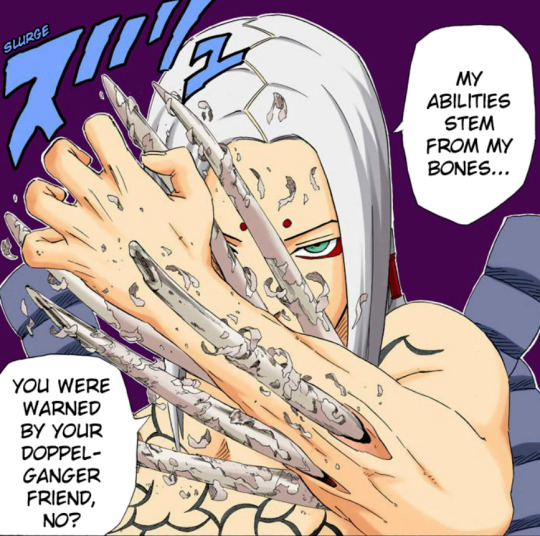
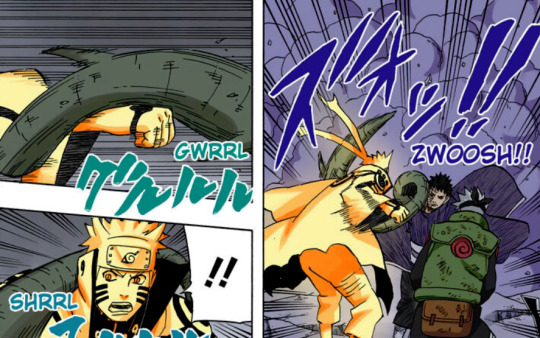
There's even a tiny link in the way that all of Kimimaro's Shikotsumyaku techniques are named after flowers. Maybe Kaguya's Bone Techniques + the chakra fruit that turned her into the Ten Tails = Wood Release?
Since we we're talking about Hashirama's sage mode earlier, I want to bring up a cool theory (Credit to Doron's World on YT) about it that I really like and it's that Hashirama is a sun sage. The theory goes that the marking on his forehead paint allusion to the symbol used in ancient chinese writing to represent the sun and that the markings around his eye are instead allusions to the Eye of Ra.


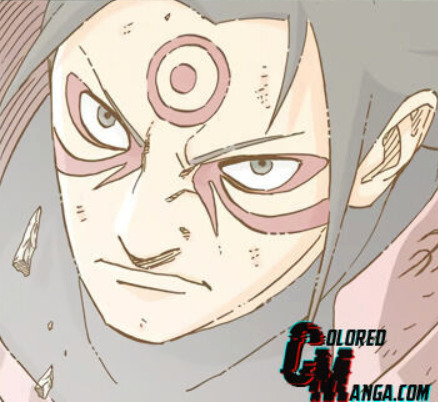
This theory doesn't have much in the way of textual evidence and is mostly riding on logic and theming. Plants need the sun to survive and as the counterpart to Madara, who is all about the moon, Hashirama would be deeply reverent of the sun. But the reason why I really like this theory is how is compliments Naruto. While it's pretty easy to figure out the similarities that Sasuke and Madara have because they're literally related, Naruto and Hashirama is a bit more muddied. However, if Hashirama is really a sun sage, that links him to Naruto who has these sun symbols in his Nine Tails Chakra mode.

Karin also likes Naruto's chakra to the sun.
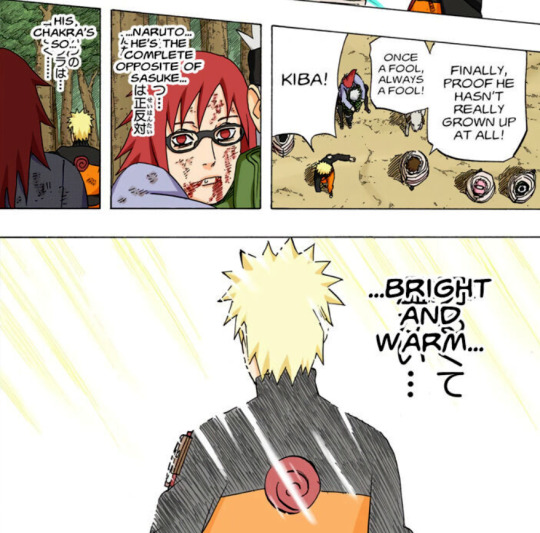
So, yeah in my mind it is just perfect if this same warmth also manifested in Hashirama, but since Asura's reincarnates can't really pass anything through each other, it manifested as his Sun sage mode and affinity with plants instead of Naruto's specific spin on Kurama's chakra. Oh right, speaking of Kurama and Naruto/Hashirama parallels, let's talk about the Torii Gate because after getting the Nine Tails Chakra Mode, Naruto just reveals that he can do this in order to seal Kurama again.
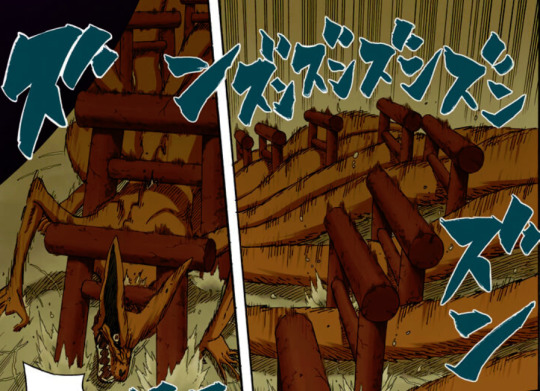
The new Torii seal is even represented on his body through the arch going over his chest in this form, pretty cool. This is another one of Hashirama's techniques, but it's never listed as a Wood Release thing. He can just do this somehow and presumably Naruto can as well. Kinda weird, right?
11 notes
·
View notes
Note
ur tags on the one post PLS share some of ur wayne analysis if you’d like
I covered the fact Wayne represents the Frogs' logos (with Emma being the pathos but I'm still trying to decide who's ethos. Bowie? Julia? Julia misquotes the Dalai Lama and talks about goddesses and crystals, so probably her?) but it's really noticeable how malleable a person Wayne is. In Ep04, while he sets himself up for being on the offense with Raj, Bowie, and why-ever they brought MK along, when it was obvious they were better off defending, he was like. defense it is. As he is a sports boy, it'd be assumed he's only good at one position (as most goalies couldn't just become a center fielder as a sub, since they don't train for the same things), especially a less "glamourous" position such as defense (in reality it does not matter, but people pretend offense players are better) He's an exceptionally good sport, which is not something we can say about all the other sports-based/jock TD characters.
It's also to note that Wayne is the first person on the team to call out MK on being a bad team player. Wayne doesn't usually look mad, but he did NOT look happy at MK refusing to huddle up and suggest there's no reason to think strategy. He's completely ok with Emma taking over and picking roles tho, so he's pretty damn comfortable with not always being the leader (as noted with Ep02, where he adapts to Emma's plan. have I mentioned those two are such team leaders for the Frogs? A million times? Oh sorry)
There's a notable subversion with their paired identities for Wayne and Raj. Wayne is the captain, while Raj is [one of the] alternate captain[s]. Essentially, Raj is Wayne's vice president. However, Wayne is a lot more reliant on Raj, than their team identities are. Throughout the season, Wayne asks Raj's opinion on everything (notably in Ep01, as one of his first defining characterizations), but Raj doesn't as often do the same. In Ep06, Raj is the one to immediately leave the catapult, while Wayne made no motion to be the one to separate themselves. He also didn't comment on Bowie calling the two of them in their "cozy", (which Raj defends, saying they're teammates, so) because that sort of attachment is so normal to Wayne he doesn't feel a need to react to people commenting on it, while Raj does. In Ep03, Wayne receives a [long] pep talk from Raj, but Raj never needed one himself going first of Emma's suggestion (or it happened off screen, but like, if it did there'd be the time for a joke where someone says "WE ALREADY DID THIS"). And also the bit in Ep06 where Raj explains Wayne has a way too stressed face when pooping (note: Raj?)
There's also the long-running plot point where Wayne is pretty concerned with what Raj thinks of him, afraid that Raj is afraid he's homo/biphobic, and that's the driving reason that Raj didn't come out to him like. Immediately. The fear of "well he tells me everything, if he won't tell me this, it's clearly something I did", but due to the 13 episode time limit of the show, Wayne didn't have time to make this insecurity about him and was just increasingly unsubtle, never really trying to force him out.
I know it's super easy and super fun to reduce the two to "omg sports himbos <3" but Wayne's got some emotional intelligence on him, and he is not a carbon copy of Raj, and it's much more than just the lack of a gay love interest. He'll always take the role of leader, but if someone else has a successful idea, he'll hop down and let them take the wheel. Paired with his leadership, friendly attitude, and general respect for everyone around him (not to Keith tho) I can see him making finale a lot more than I can see Raj making finale.
I think having the boys on separate teams and having Raj leave pre-merge could be really impactful. Wayne waits at the cabin for Raj to come back and tell him who left, but he just... never returns. Wayne wasn't at the ceremony, so he didn't even get to say goodbye. Wayne wants to throw the challenge but someone (Emma, Bowie, Julia, etc) tells him to snap out of it because Raj would be furious Wayne gave up on himself. And Wayne has to pick himself up off the ground and win for Raj. Like the Katie and Sadie micro-arc, except give Wayne more time to suffer within himself before being told to stop, as well as not axe him with no actual development. I think that kind of emotional rupture could change my brain chemistry.
#Wayne seems to be the type to be worried if people don't see him as an authority figure without demanding respect#like he'll get sad they don't respect him but he won't get too angry#more like he'll mope and hoot about it which is so fucking funny to picture#me: [write a hypothetical horrible thing to happen] omg that'd suck! I NEED it to happen now...#obviously the show might axe them together again since they need a double elim but look me in the eyes. could happen#sorry if this is like soooo surface level and I sound like a 8th grader lol#everything feels so deep when you think about characters people see as comic relief and nothing else#me: I love Wayne! also me: I need him to cry next season. I want to hurt.#piggy's td posting#stunfiskz
25 notes
·
View notes
Text
spoilers ahead if you haven't listened to wolf 359 and you like scifi and/or story podcasts (or if you don't wanna read a long analysis post) PLEASE go watch it and ignore the rest of the post. its so so so good i promise.
so ive been re-listening to wolf 359 for probably the fifth time on my weird old outdated patched version of spotify. and spotify does this weird thing where if you play something else, then come back to a podcast ep you're not finished with it goes back a minute or so, presumably to help you remember what was going on. and i usually skip the last few minutes of each ep when the barrage of ads starts. which means that as i go back and listen to it for the nth time, if i forget to manually skip to the next episode, each episode starts by playing the last minute or so of the ep until i find my phone and rewind.
and its actually been a shockingly fun way to relisten, especially as the show goes further and further from silly goofy space hijinks to serious suspenseful drama (with occasional hijinks). i'm just struck by how purposeful each episode is later on in the show (and earlier, but the episodes get more...purposeful as the plot starts reaching its climax). there's exceptions, obviously, but the general structure is half the characters doing something silly, while the other half do something important and serious, and the two contrast each other. and even though the two situations seem disparate and tonally opposite at first, they always end up being more of a parallel than a foil by the end. usually, this kind of dawns me in an "oh, that's what the point of this episode was" moment brought on by the last few minutes of the episode.
one of my favorite episodes, ep 34 "a matter of perspective" is a great example. half the crew is trying to restore the signal for alien transmissions, the other half is playing a terrible board game. this is also in the pivotal part of the show before our evil corporate overlords show up where we're getting to know jacobi, maxwell, and keppler in a relatively short period of time compared to the rest of the cast, and i'm always impressed by how fleshed out they were when they got a lot less screentime.
anyway the contrast here is really interesting. keppler is demanding the impossible from eiffel, and the rest of the crew sans jacobi are trying to win an impossible game (the accursed funzo). at the end of the episode, jacobi explains why keppler is doing what he's doing (side note: the whole military "demand the impossible from your subordinates" thing is so insane), and keppler remembers the end to his joke: the pig, despite its usefulness, despite the fact that it does fucking taxes, is still being eaten. slowly but surely. it's such good insight into kepplers character its such good writing! he is a corporate slave who doesn't realize it, he is a deeply talented man who is letting his entire life be consumed by people who do not care about him and his wants and needs and happiness for a cause he will eventually learn is abjectly evil. meanwhile, maxwell, hera, lovelace, and minkowski finish their game of funzo by collectively losing after playing for 10 hours. they are also pouring time and energy into something pointless! everybody loses!
anyway the reason i even mention the whole spotify rewinding thing is that i never really noticed the point of this episode until i listened to the end of the pig joke first. which is probably on me, the metaphor is really obvious in hindsight, but up until now i just thought of the funzo part of the episode as haha silly board game time. having the thesis of the episode presented first is making me realize how genius the writing was in episodes i previously didn't get. i think the entire show is kinda like this, i could listen to it an endless number of times because each and every episode has some kind of double meaning that isn't always initially obvious, especially when you go in blind not knowing that things are getting serious.
the only other work i've read so far that does something similar is probably house of leaves, which is designed to make you read it over and over and search for meaning and has 3+ plots occurring at any given moment. i'm just really struck by how masterful the writing in wolf 359 is that it can achieve a similar feat without the meta elements, nebulous plot, and multiple narrators that house of leaves has.
short version: i think it's really fucking cool how the end of each wolf 359 episode presents the thesis of the episode in a non-obvious way, and listening to the series while having the last few minutes presented first is helping me understand what episodes i didn't previously appreciate were trying to get across. wolf 359 is really fucking good, basically.
#i just really love it when something can be reread and each new reread is more enjoyable and lets you notice new things#feeds my need to overanalyze everything#anyway sorry to uhh all my mutuals and also w359 fans who dont wanna read all that#in my defense. i have adhd.#wolf 359
8 notes
·
View notes
Text
AG Watchthrough Episode 1: Get the Show on the Road! AG001. Long Post, I promise they won't all be this long, this is AG commentary georg, outlier.
Well. Outlier until contest episodes. I won't apologize for who I become once we hit those. Anyways, RE: above. There's usually not TOO MUCH of a plot in AG eps to even comment on, hence this post as an outlier for the pilot episode. So! Starting a full AG watch. I have never fully watched all of AG by sitting down with the intent of watching all of it. I have seen all of it, but not in a directed, intentional, in-order way. Changing that today to really see how it holds up as a whole outside of the episodes I tend to gravitate towards! I don't think I'll realistically follow through with this for more than a week. Going to be honest. BUT I HOPE TO! We'll see. The plan is to watch episodes in bulk but schedule posts once a day. Posts will likely get pretty long for some episodes, short for others, because AG is wildly varying in 'things to talk about' episode to episode. Anyways, episode 1: Get the Show on the Road! AG001.
Side note. I think I will put this in relevant character tags if I have any commentary on specific characters. One, so I can find my own posts. But two, I know as someone who likes characters who don't always get a whole lot, it's SO EXCITING to see people talking about them, so on the off chance there's, like, a Morrison fan out there, I think I should put it there??? Like, I'll read Hoenn Coordinator commentary from 2013 to feel something, so I want to be able to provide that on my end, too. I'd be heartbroken if someone did an in depth ep-by-ep analysis on them but didn't tag it so nobody could see it. ANYWAYS!!! I'll play it by ear and do it when it feels relevant and not just 'yeah this person showed up, I guess'. I don't want to be annoying but also you can just block the #ag watchthrough tag. Or just block me, I guess lmao.
So, the episode opens where the last episode of Master Quest left off (OS274, Hoenn Alone). Basically, Pikachu has electric rabies and May is getting her first pokemon.
The episode opens with May giving her internal monologue/narration about starting her journey. She hits her head on a tree, which may explain some of her decisions later in the series (/joke), but she's on her way to Birch Lab to get her first pokemon. Does she want to? Not really, but she DOES want to travel and this is a way to accomplish that. This is instance one of what I'm dubbing 'Early AG Girlboss May'. (Basically, in Early AG May was more of a go-getter. Or rather, she had more agency and opportunities to get her own way. Early AG May is far more... frankly, shown to be intelligent, which drops off rather quickly in favor of big of heart, dumb of ass May [whom I do love dearly]. I think it's largely done to emphasize Ash's mentor role and her student role, but I digress). I can and will make a separate post on this if anyone wants my thoughts on her character inconsistencies. But for now, just know she's not a fan of pokemon but will deal with it to have a chance to travel the world. She has a goal, she will get it done and use what's at her disposal. Anyways, behold. A girlboss in her natural habitat.

Now, we switch to Ash and Pikachu, alone and Brock and Misty-less (well, until the mirage special. I'll... get to that when the time comes, I guess...sigh).
We also find out Jessie's been to Littleroot before. I, uh, don't know if that was ever expanded upon??????? WAIT same thing after iirc spontaneous combusken where she makes some comment about young love and heartache and stuff. Jessie has some weird backstory in Hoenn (well, SC is Kanto but yk) that I don't remember ever hearing more about? Huh. Anyways. You'll notice a pattern of this in AG, of random interesting details being brought up and immediately forgotten.
Back to Ash. No pokemon center in the town, so he's headed to the Lab, where May's headed too. Birch is 'out conducting an experiment', so Ash just hangs around until he can go to the lab.

IN COMES BIRCH WITH THE JEEP!!! Ash's uber is here.

After giving Pikachu a quick look-over, Birch explains that Pikachu can't release its electricity regularly so it's all building up and getting a bit explodey. Apparently it's due to magnetic field exposure, and I won't question the science or lack thereof. Birch, fascinatingly, doesn't question when Ash explains that Pikachu was strapped to a magnet. Anyways, Birch's driving remains amusing to me.
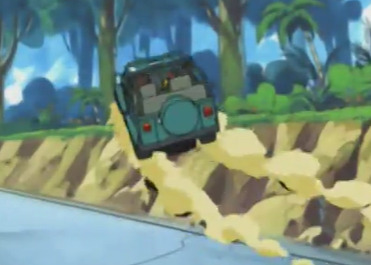
Look at him go. This is fine and normal. Average Maryland driver.

Anyways, they get to the lab and hook Pikachu up to, quote, 'A device that will rid Pikachu of all its trapped electricity'. It goes bad. Another pattern you'll notice in AG- lots of explosions. Not just Team Rocket blasting off (solarbeam, go), either, just... lots of general, everyday explosions.

So, Pikachu quite literally blows a hole in the side of the lab and escapes in a frenzied state. Ash runs after Pikachu with no other pokemon, Birch follows Ash with the three Hoenn starters, and Joshua the lab assistant is like "WAIT what about that girl we're going to give her first pokemon to- oh, okay bye I'll figure that out myself then".
Team Rocket's... here, I guess. Another AG pattern we'll notice. They show up. they blast off. they leave. rinse and repeat. Jessie is depressed this time around I guess.
Anyways, says Pikachu could explode at any sudden disturbance, so that's a hell of a way to start off here. New season with the beloved mascot? Yeah, he's about to explode. Sorry about that. So, Ash and Birch split up to look for the imminently detonative rodent.
Switching over to May now, who shows up at the lab. Joshua explains that Birch has an emergency in the mountains to deal with and asks May to wait there.
May does not wait there ("I've never been much good at waiting! Bye!"). Joshua uses one of his, like, four lines to complain about kids these days. Instance two of Early AG Girlboss May, having, uh, an actual choice that she can make that isn't just travelling with the group in the back until a contest episode and then going back to travelling with the group in the back. Brock and Max get this FAR worse, though, a topic for a few episodes later.
SO. Birch and Ash are split up looking for Pikachu still. Birch slips and falls and we get a reference to the opening of RS(E, but E has Zigzagoon iirc), with Birch being bullied by puppies. Take note of May's bike in the back. Last we'll be seeing of it. I wonder if she got a new one in the johto arc that we never got to see. Sigh.

We aren't quite halfway done with the episode yet.
Anyways, Birch asks her to help him out and to choose a pokeball. She chooses Mudkip, who promptly water guns her in the face. I guess Mudkip is like a horse or something, it can sense fear. Or rather, it can sense dry apathy and mild dislike. Birch directs Mudkip to use watergun on the Poochyena, which it does.
Ash finds Pikachu and is promptly electrocuted. Badly. But he's fine.
...He's fine, right?
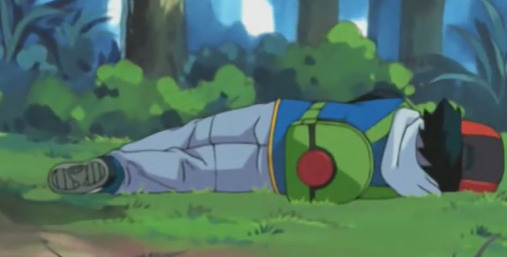
Birch and May see the thunderbolt and rush on over. We get this line from Birch, which admittedly did make me laugh.
"Pikachu. It might explode."
LIKE. OKAY THEN! Way to tell it like it is, bud. Then, seeing Ash, he yells, "PIKACHU COULD EXPLODE AT ANY MOMENT!" So, things are going absolutely perfectly great here. Pikachu panics at the noises and runs right off of a cliff, and Ash dives right after it.
We are interrupted by who's that pokemon.
It's Lanturn. 👍
Ash is falling, he catches Pikachu and a branch and is dangling. Birch and May get a rope and pull him up. Pikachu bites Ash and feels bad about it. Ash doesn't really acknowledge the random person there (May) but to be fair, he's got other stuff going on.
Team Rocket shows up. Pikachu blasts them off and releases electricity that way. Get REALLY USED to the team rocket portions being blown through like this. Just trust me on this, I'm doing us all a favor here. AG TR is REALLY FUNNY when they're funny!!! But... all the great one liners can't make up for the repetition of AG TR. Moving on. Pikachu feels better now (well, he passed out but isn't sick anymore), and....
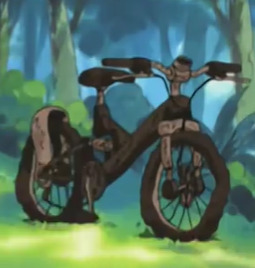

Yep. Bike barbecue'd. 2 for 2 now, we all saw it coming, there it is!!!
They go back to the lab. May eavesdrops on Birch, Ash, and Joshua, and knocks over a flowerpot, alerting them to her presence. She introduces herself and Birch asks May to choose her first pokemon. Ash asks if Treecko is a water type. It is not. May chooses Torchic!!!!! Birch tells May that if she works hard, she can be an even better trainer than her father. I'm sure we all know who that is but it's meant to be a mystery at this point so let's all act intrigued.
I'm going to expedite the end of the episode. May inspects her bike, it's dead, she goes in and sees Ash asleep next to Pikachu and seems to think their bond is nice, even if she herself doesn't care for pokemon. She just watches them through the cracked door, slightly weird but go off queen, and she attempts to bond with Torchic.
NOW. TAKE A LOOK AT THIS. THIS IS GOING TO BE A RECURRING THEME. MAY IS TALLER THAN ASH IN THIS EPISODE. ALL THROUGHOUT AG, THE HEIGHTS ARE HILARIOUSLY DIFFERENT. I will be pointing out amusing examples of this. AG001: May is tallest. I am making a spreadsheet and keeping track. This gets far funnier when Morrison and Drew come into the picture and we get to just watch it wildly vary every single episode.


Now, Ash AND May are sent off to register for the Hoenn League in Oldale.
SO, this is interesting and another instance of Early AG Girlboss May. May doesn't want to go alone on foot, and her bike is ruined. So, she plays this pretensive game of "oh, my bike is ruined (thanks to you), and I don't want to travel alone on foot, if only there was some solution- OH I KNOW! Let's go together, I happen to know the way, it's no trouble at all, shall we?". This interests me because it shows... manipulation is the wrong word here, but again, like, it shows pretense?? that May generally lacks once her characterization firms up a bit. They're still figuring out writing her at this point, I guess, and we see her be more calculated and thinking and using things and situations and people to achieve her goals. Again, this does drop off into dumbass territory before too long, but it is interesting to see and to think about. When writing May I try to strike a balance- more emotionally intuitive and more of a go-getter like early ag, but not in that premeditated sort of way. She's interesting with the amount of wiggle room you have in her personality, because it simply isn't the most consistent. You get to pick and choose a bit more.
But the episode ends, and May and Ash head on over to Oldale town to register for the league.
End of episode metrics:
Height ranking: May > Ash.
More metrics will be added as we go on. I considered an explosion counter but I would lose track. We're already at like, six /not joking, deadass.
#ag watchthrough#i need to make a tag for when i watch pokeani as a whole#i have the regular tag i use completely arbitrarily and the trashcan for shitposts/memes and the talk tag#BECAUSE I NEED THEM SINCE THE SEARCH FUNCTION IS NOT AN ACTUAL THING THAT FUNCTIONS#uhhh#taylor watches pokemon#👍#i need to make a tag directory for myself tbh#anyways#pokeani#coordinator may#^I have nothing interesting to say about Ash here. might be a pattern.#there's a reason nobody watches AG for Ash. even when they do watch ag for ash plotlines#it's for cotds and battle frontier stuff#and not. ash.#LOVE ag ash!!!! but he's the least interesting thing about ag aside from some of the episodes themselves#I LOVE AG I PROMISE GUYS /GENUINE#I just love AG for reasons that we'll get to later and. not yet.#scheduled this post btw#halfway through this i got worried that people would think it was dumb that i was putting this much effort into pokeani stuff#but ONE this is my blog. TWO i'm doing the lord's work#THREE literally you guys are here to listen to me talk about pokeani so like. here we go
8 notes
·
View notes
Text
@nobodysdaydreams Here you go
Chapter 28
BODS THE TITLE IS SCARING ME
This part really feels like TPD, with all the planning and secrecy
Ajdsdjfk Constance just staring at him really intently to freak him out
Poor Nathaniel
“It was rather unsettling, though being physically assaulted by one of the children was a much less frightening concept to Nathaniel than the possibility of having his mind read.”
Yeah, unfortunately that tracks
Reynie being all polite is very cute, though. And then there’s Kate, who is on the defensive every time
“Like he’s just some guy named Nathaniel now?”
Kate and the importance of names again! I need to write another analysis about that
And of course her lovely nickname suggestion
Yeah, Reynie!! The “L” stands for “Le”! It’s weird, right?
I’m very pleased that Constance is the one to reveal Curtain’s full name
Sticky’s aunt!! I love her so much, you don’t even understand. I was so hugely upset by how the Show changed things, but you’ve turned that all around and now she’s one of my favourite background characters in your story.
“He sleeps, he eats, he takes up space,” said Constance. “And he cleans. A lot. Obsessively. It’s concerning and confirms what we already knew. The man has serious mental problems.”
I don’t know how you positively nail each character voice every time!! It’s so impressive, and I love when certain lines stick out in my head because I feel I can hear them being said <3
Kate’s house!! Such a good plot point, so full of memories and emotion
Marcus! Marcus is so sweet. I’m really glad that you talked more about him, Sticky deserves to have good friends
Miss Perumal and Rhonda! A very good team. (And possibly the most forgiving out of the grownups, besides Mr. Benedict of course)
Ooohhhhhh. SQ photo album…
I AM NEVER GOING TO STOP BEING UPSET THAT HE WON’T TALK ABOUT HOW CLOSE HE WAS WITH THE WETHERALLS
BODS YOUR FLOORBOARDS ARE MINE
NATHANIEL. I get that you two are different in some ways, but. YOU’RE IDENTICAL TWINS??? SAYING SQ LOOKS MORE LIKE NICHOLAS ISN’T THAT BIG OF A DIFFERENCE??
Of course, it’s not his exact physical appearance that Nathaniel’s talking about, it’s more the fact that he feels too guilty and undeserving to be associated with his son. Because nothing is ever simple with this man
I love when Miss Perumal gets to talk about parenting with Nathaniel, it’s so interesting. I don’t know, because I don’t have kids, but to me it seems like you’re doing a really good job writing about it, Bods
Poor Number Two. She’s right, even though no one knows it yet. There is something suspicious going on :(
Garrison mention!! Garrison would probably like to stay as far away from this mess as possible, but of course they aren’t going to let her do that
And naturally the thing that Nicholas fixes on is correcting his brother that Constance is his “roommate”. Not the ridiculousness of anything else in the statement
I like how you use the verb “comforted” often, it gives a really good note on the tone of the situation and how the dialogue is being said
Oh no. I’ve read the sad, sad tale of Puddles the duckling, like, three times now. We’re skipping it
Kate! Kate popping out of vents is the best thing, and I love how you set it up here. I can just see it in my brain
Nooooooooo
Bods I am gnawing on all of your pens until they are beyond repair. This part guts me every time
I love when we get a giant brick of Nathaniel dialogue because he’s explaining something. It’s very good
AND THIS IS THE PART WHERE IT ALL GOES SOUTH
I genuinely gasped and put a hand over my mouth when I first read this
I’ve been thinking about Nerissa and her outbursts a lot, and I have so many questions about how her powers work…
I think SQ’s mind would be a forest
I know Nerissa has not the best of intentions, but ever since she got introduced all I want is to give her a hug. I think she needs it
Now we get to see Nerissa’s plans from her point of view! I always love how you explain stuff via multiple different characters, it makes it really interesting and it somehow doesn’t ever come across as boring or talked about too much
Although it makes me wonder how many fake identities she has…
“The boy is eighteen Natty, I’m sure he doesn’t need or want you constantly helicopter parenting him like this”
As if she is not also doing the exact same (And arguably worse)
“his whole…team of genius minds and trained fighters”
Ah, yes. Nicholas, his adopted family and friends, and some children. Obviously an impossible number of enemies /s
Erika! She is somehow STILL not getting paid enough for this. Let her go do something else, like be a National Park ranger. I’m sure she’d love it
And the slip back into having the narrative refer to him as Curtain!! I get all excited every time you do that, no matter how many times it’s been now
“He had expected to see anger in his SQ’s eyes at having secrets kept from him”
I’m burning your house down
Curtain’s just running on frantic autopilot and it’s only making things worse. I know this is, like, the third POV for this scene and maybe the fifth time I’ve read it, but still. I am taking some scissors to your window drapes
“And to think, when I was a kid, I looked at you like you were my hero, I thought you were brilliant, I used to dream about being like you! And now, I’ve been putting up with everything you do, all the times you ignored me, filled your schedule with work, got stressed over some mundane detail, and acted like a complete control freak, all because I thought you were doing it because you actually cared about someone other than yourself.”
AAAAAAAAAAAAAAAHHHHHHHHHHHHHHHHHHHHHHHHHHH
Bods. Bods you need to chill on occasion. Seriously, I don’t know how much more of this my heart can take, and I already know what’s going to happen!!
I Am Foaming At The Mouth
AND ONCE AGAIN CURTAIN’S SELF-DEPRECATING, GUILTY, OVERLY RIDICULOUS MENTALITY GETS IN THE WAY. AGAIN.
If he could take a step back and, I don’t know, go to therapy????? Then maybe he’d be able to have this conversation with his son. BUT NOOOOOOOOOO. IT’S EVIL PLANS THIS AND MIND ERASURE THAT. SO HEALTHY THERE, LEDROPTHA. NICE JOB /s
“You’d think that after all those losses he’d be used it to by now”
I Am Screeching At A Tone To Shatter All Your Glass
AND GARRISON. GARRISON DOESN’T KNOW. HOW COULD SHE? BUT SHE STILL UNDERSTANDS THE ENORMITY OF SWEEPING SQ. AND SHE’S STILL HORRIFIED.
“Please Dad. Don’t do this. I love you. I’ll do whatever you ask, and I’ll…I’ll stay. I won’t leave. I’ll stay here with you, forever. I’ll be good. I promise.”
This is always one of the worst parts for me…
“She supposed death wouldn’t be so bad. Garrison knew she deserved it, and she wasn’t entirely sure how she would even be able to keep living with herself after all she’d done. / But she still feared the pain.”
Someone PLEASE help this woman
Curtain hugging her… But it doesn’t do either of them any good…
AND CURTAIN CAN’T BRAINSWEEP HIMSELF BECAUSE HE FEELS LIKE HE HAS TO BE RESPONSIBLE FOR ALL THE THINGS HE’S DONE. HE HAS BLOCKED OFF EVERY OPTION FOR HIMSELF
Oh dear, I just keep rereading the last bits instead of commenting. Please know they are just as amazing as everything else, but I don’t have any words for any of it…
Poor Nathaniel has been locked into a truly impossible task, and Nerissa certainly isn’t helping. Although, I must say that her dialogue can be pretty funny
“I really think you’re making this into a bigger deal than it needs to be. Nicky has never struck me as a particularly difficult person to kidnap. One bad pun is enough to knock him out. Just tell a clever joke, wait for him to pass out, and shove him into a sack.”
“Nathaniel had tried to think of other solutions. Really, he did. But although he knew that Nicholas would willingly give himself up at the word that his nephew, or that anyone really, was in danger”
Man, you really are so good at balancing humour with drama
#s.o.s.#Sorry if it's a bit short!#I promise I'm working on the rest of them#ESPECIALLY THE NEW CHAPTER WHOOOOO#So excited to read that one
6 notes
·
View notes
Text
So about today's episode!
Oh Lord! Showrunners don't have any mercy for Sun... like no at all...
That was so unfair to rub reminder of Lunar's death and their argument before Lunar left the Daycare straight into Sun's face... Like holy moly! Sun truly deserves better...
Just like @basilbots said Sun wouldn't end the same way this Lunar ended being. But I'm 100% sure that showrunners tries to set up the bigger plot point in Sun's overall character arc. At first I thought that it's just only me stretching what was happening in the show and I was just stating wild theories about Sun and what could possibly happen to him. But things that are happening in the show prove me more and more that what awaits Sun is a tragedy...
Because it isn't only that Sun has low self-esteem and depression and that he blames himself for most of things that happened to his family. It's also that others more or less, alongside things that are happening, constantly remind Sun of his mistakes to the point that Sun might start to take them completely out of proportions, to treat his mistakes as something so horrendous and bad that they're just unforgivable. He may start to view his actions as some great decisive factor with bigger impact on what's happening than they actually have. I mean he already expressed to Earth that he thinks that he had much more control over things that was happening despite the obvious fact that Sun didn't have any control over what was going on with Moon. He didn't knew that Moon went to his own head and that he needs his magic to get out safely. Heck, he didn't even know that the bunker where Eclipse was had magic circle with Moon's mana pool. Moon had never talked with Sun about his own things. Moon didn't even talk with Sun about things regarding Sun. He was basically deciding about most of the things for Sun.
And to better get my point across let me explain you what impact the situation with Evil Lunar might leave on Sun. Because I saw that some of you realised the parallels between this conversation that Sun had with E Lunar and the conversation he had with our Lunar. And Sun also realised that this conversation is basically what happened between him and Lunar. But we know that isn't exactly the same situation just like @basilbots said. But it's pretty much obvious that Sun doesn't view this the same way we fans do. But there is also something else that Sun could take out from this encounter which is something more... dangerous to Sun's mental state and which I think fans didn't realise yet. What I'm trying to say is that I think that Sun might "realise" that what happened to the E Lunar might as well have happened to their Lunar. Sun might look at his actions towards Lunar disproportonally to what they truly caused. Because E Lunar said that "why do you think Lunar left? maybe he felt left out (pushed away), unwanted (unneeded)" or something along those lines. I think that Sun could easily read that as a "I'm not only responsible for Lunar's death but if Lunar was alive I could've easily pushed him over the edge" and I mean that Sun could easily "realise" that he could've been a reason for Lunar's mental breakdown which could end up with Lunar losing it. I hope that you understand what I'm trying to say here. Because I think that Sun might really see that he's actions have much more impact than they actually have.
I really doubt that Lunar would be completely safe from Eclipse's clutches if he didn't run away from the Daycare or I definitely don't think that how Sun acted towards Lunar in their fight would make Lunar so bitter to the point that Lunar would start lashing out on others or would try to get revenge on those who wronged him.
But I'm really afraid that Sun might start to view his actions as something that leave such a heavy impact on others or have such a big influence over what's happening that the guilt will completely crush him.
And it really seems that I am right with my analysis about Sun and that he feels or will start to feel like he's the one who is evil. Because if he's the one at fault or if his actions caused all those horrible things that happened to his family then what does it make him? What does it make Sun, other then the villain, the bad guy?
I hope that you don't mind that I tagged you @basilbots because I thought that your post about Sun and latest episode was really spot on!
And about computer... I'll make stand alone post about it and its relation to Sun i.e. how it treats Sun.
#sun and moon show#sun and moon show sun#fnaf sb#fnaf sun#sams sun#sun and moon show lunar#sams lunar#sams evil lunar#sun and moon show spoilers#sams spoilers
19 notes
·
View notes
Note
Can you explain how Ghetsis shows autistic traits
Somehow I get the feeling that this ask is coming from a place of doubt rather than genuine interest, which makes me tempted to just say "He told me himself. Goodbye." But sure!
Ghetsis is Autistic: Evidence because some people dont like the idea of autistics projecting on characters they like without 16lbs of proof
My personal favorite of his traits: His pacing. Almost every time Ghetsis is seen in the games, he's pacing around as he talks— a common autistic trait. This is seen both in BW and BW2. Very rarely can he be seen rambling and standing still simultaneously.
Repeated speech patterns. Autistic people who have trouble with social interaction frequently repeat certain words/phrases. With Ghetsis this is most notably the "freak without a human heart" thing, for better or worse. He repeats several other things throughout the games with little variations, such as "the look on (someone's/your) face when (they've/you've) lost all hope" "random/unknown/ordinary trainer from who knows where" "no matter who does what" "I am perfect! I am perfection! I'm the perfect new ruler of a perfect new world!" "I was expecting exactly that kind of move!" etc.
As a bit of an add-on: Ghetsis shows repeated actions as well— shaking his fist in BW and slamming his cane in BW2.
Scripting. Once again, autistics who have trouble socializing often have premade scripts to use when conversating. Although Ghetsis prides himself in his "public speech skills," they're all just about the same script. Of which he fumbles and stutters over multiple times. As soon as he has to go off script, nothing he says correlates to the task at hand. He may even respond with another scripted response, even if it's not appropriate for what he's responding to. (Example: Castelia City, BW. Burgh asks why Ghetsis plans to "liberate" pokemon, to which Ghetsis responds by saying he hired knowledgeable people from around the world to teach his son. Ghetsis that is literally not what he asked)
Special interests and devotion. Paying attention to Ghetsis' dialogue and actions, it's clear he has a special interest in Unovan history and legends. He frequently and without prompt goes out of his way to explain the founding of the Unova region and the story of the two brothers. In BW2 he is revealed to have been researching the Abyssal Ruins and attempting to find the Relic Crown. He even put in the work to translate the writing in the Ruins BY HIMSELF. it's highly implied that Ghetsis and N are direct descendants of the ancient Unovan king, meaning Ghetsis likely wanted the Relic Crown not to sell, but to keep safe and cherish. This seems to be one of the few things Ghetsis wanted out of genuine passion rather than out of a desire for power. Furthermore, the Entire plot about Ghetsis not being able to become the hero of legend himself, crowning N the "king" of Team Plasma so he could become the hero instead, building a castle around the pokemon league, etc points very heavily towards just how passionate Ghetsis is about Unovan history. Not to mention that he had this passion, this dream, this "beautiful ideal," for DECADES. He centered his whole life around becoming the new Unovan King, to the point where he tries again and again, giving his everything until he both physically and mentally cannot continue. If that's not autistic dedication, I don't know what is.
There is DEFINITELY more I could add, such as sensory issues and comorbid disorders, but the rest is a little less obvious and borders more on headcanon and more personal analysis/interpretation. But to wrap this up: MANY of the autistic traits seen in N are also observable in Ghetsis, just in different subjects. They share absolute, burning passion to achieve their dreams. They're passionate about a certain subject. They have unique speech patterns. They have trouble interacting normally with others. It's very likely N's autism is genetic, passed down from Ghetsis. (And don't come here and say they're not blood related. Just look at them. You're gonna believe Ghetsis when he says N isn't his actual son? The guy renowned for lying and manipulating, who has a strong desire to disassociate himself from N by any means possible? Of all his lies, THAT'S the one you chooe to believe? Okay.)
In conclusion, Ghetsis has super mega autism just like his son.
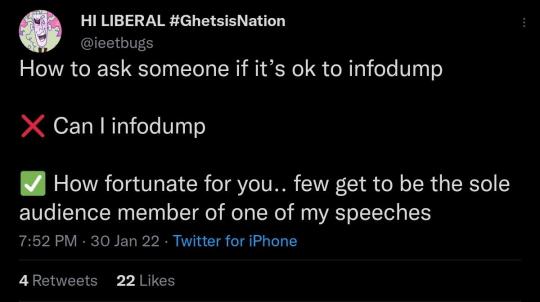
[screenshot courtesy of my good friend @ieetbugs ]
Thank you for listening. Feel free to add on if you have any more evidence towards his autistic swag
And once again fuck off if you're only going to argue about how he's not autistic or something. Who gave you the right to dictate who we see ourselves in lol
#ask#ghetsis#ghetsis harmonia#pokemon#pokemon black and white#pokemon bw#pokemon black and white 2#pokemon bw2#team plasma
103 notes
·
View notes
Note
awwww 😭😭😭😭
Did you write a review on the legendary teen Titans series? (Aka what young Justice could have become if they weren't overly ambitious)
What's your opinion on Paul Dini as a writer?
(Follow up to these two previous asks)
Sorry nonnie! 😅
It seems that we both tripped down a rabbit hole of doughnuts.
youtube
I assume you’re talking about the Teen Titans 2003 Animated TV Series? In that case, you might be thinking of another user – I haven’t personally written any reviews for it. I do have a lot of fond feelings towards the show, though; it was my first real introduction to DC Comics alongside the Justice League/ JLU animated series. My Tumblr has a Teen Titans tag where I share art, meta etc. and I do have some thoughts about specific plots or narrative elements – you might also see me make occasional reference to it as an example on some posts in the writing advice tag.
Just for the sake of expectation management, I should explain that my Tumblr isn’t really a traditional “review blog”. And yes, I know that probably sounds a bit crazy considering the frankly unhinged amount of YJ analysis I’ve written, especially since I’ve been blogging less about other stories in the last year. Burnout, what can you do?
Really I’m more of a writing/ story-analysis blog. Sometimes I might write a semi-review style post where I try to break down and articulate a particular technique/ element/ execution/ implication of a narrative in order to understand what it’s doing well or why something isn’t working. As I said in the very first Frustrations with YJ essay, I think storytelling is fundamentally about communication and understanding. I got into fandom as a fan-reader turned fan-writer (AO3 wink wink), and before that I worked as a casual English tutor. I want to learn from the ways different narratives succeeded or failed at communicating their stories within the restrictions of their medium(s) so that I can better find, discuss and even tell stories myself.
Because of that, I’m also a big proponent of the Death of the Author approach to media analysis. Let me copy the definition over from that first essay real quick:
DEATH OF THE AUTHOR
This theory posits that, because commercial art is created to be consumed, not just created, the audience’s interpretations of a work should be considered as just valid as the creator’s. The work must stand on its own and creators cannot micro-manage their audience’s response to it.
1. A creator’s intentions and biographical facts (political stances, religion, etc) should hold no special weight in determining the validity of an interpretation.
2. Save for re-releases/reboots or new entries, the creator cannot and should not attempt to retroactively insert information or interpretations that were not present in the original text.
I generally don’t look too deeply into or follow the specific people behind (non-fan) works. This isn’t always the case – if I like a specific author’s style I might look up their body of work to read more; some stories are clearly rooted in their creators’ specific opinions or experiences, which makes for interesting context; and sometimes I like to learn about the behind-the-scenes methods/techniques/production woes of a bringing a specific story to life – but mostly I put the priority on what I can learn from the final product.
As I’ve said before, commercial storytelling is the result of more than just one person. Under the right conditions I think a rank amateur or complete hack could produce something amazing and, if faced with enough production headaches, a usually-excellent creator could end up outputting utter drek although I expect that drek would at least be creatively interesting.
The questions that interest me more are: what was this narrative trying to communicate? what techniques were used/ creative choices were made? how well did it succeed? could a different approach have been used? and, what restrictions/limitations/priorities could have led to the final creative decisions? To me, information on a creator’s circumstances provide context for narrative analysis. Since I generally don’t know them I try not to postulate their actual intent too much, only the potential intent suggested by the story.
SO WHAT THE HECK WAS I DOING WITH YJ, THEN?
What happened with Young Justice is actually an outlier for me in both regards because of how baffling flawed the series ended up being. Back in the pre-revival days I paid a lot of attention to the textual canon of Season 1 because I had started writing a fanfic based on it and wanted to do the story justice (heh). The result was I went into the later seasons with a lot more awareness of the canonical details and storytelling techniques – and (like I said in the final Invasion case-study) I ended up being blindsided by how instinctively bored and annoyed I became just a short way into an attempted Season 2 rewatch, despite the fact that I was actively trying to study it.
The reason I kept coming back with more and more posts is that I never felt like I had successfully grasped or articulated why I had such a strong and unexpected negative reaction. I think it’s a similar impulse to what Dan Olson cited as making the Nostalgia Critic’s Parody of The Wall so weirdly compelling: there's a confusing contradiction between the level of work required to implement the sheer amount of stuff that Young Justice tries to include, and the absolute thoughtlessness of how sloppily that stuff was actually executed. A multi-season, multimedia story like Young Justice is a long-term project: there are too many layers of production involved for the end result to be made in a brief flash of impulse or accident. It needs some sort of sustained creative motivation to drive it… but I could never find a coherent creative intent that would satisfyingly explain the decisions on display. Never before or since have I seen such a promising launch be followed by sequels so fatally flawed as to strip away every component of the original’s creative identity. There’s a reason I subtitled that masterpost A Massive Failure of Narrative.
This is also why I went after lead-showrunner Greg Weisman a bit, despite not usually doing that. The choice to exclude (or consciously excise) over 70% of the critical narrative substance and sequester it away in non-textual social-media /ask-blog retcons means that you cannot escape engaging with Weisman when trying to engage with the later seasons at any level of depth. As a Death of the Author proponent this ticked me off just on-its-face, but it also meant that he and those seasons are inseparably intertwined. Regardless of whether it was a conscious choice arising from his sense of creative entitlement, or simply a case of narrative incompetence self-selecting for a primary audience with a high tolerance for media-illiteracy Nigerian Prince Email Scam-style, the end-result is the same: Weisman gouged holes his narrative and left it to suffocate while he sucked up all the oxygen in the room. Then, later, as I encountered people from other fandoms whose narratives had been similarly decimated by Weisman, it became impossible to ignore how inseparable his personal flaws are from those narrative failures. As I alluded to in the last ask, you can separate the original seven Harry Potter texts from their author: Joanne Rowling and her politics could evaporate tomorrow and it wouldn’t change people’s ability to enjoy the story as a standalone work (in fact, the absence of her modern politics might make some of the more unpalatable flaws easier to accept as honest oversights rather than ominous foreshadowing). Meanwhile, Young Justice is such a disaster because the later seasons stop being about the original story and increasingly become about Greg: his failures at basic storytelling, his disinterested misunderstanding of his own characters, his weird fixations, his patterns of reactionary prejudice, casual double-standards, deeply disturbing attitudes about consent and power, and a self-righteous entitlement that resents being held accountable. Unlike Harry Potter, you can’t put Young Justice S2+ in a bubble. The problem at the root of every other problem with Young Justice is that it doesn’t have an actual narrative... and in the absence of a coherent central narrative, the text itself has become the story of Greg Weisman's terrible creative choices. His self-indulgent proclivities pervade every step of the later seasons' broken theming, bad pacing, warped characterisation, contradictory lore, intra-textual hypocrisies, over-stuffed cast and weird fanservice: baked-in at a level that cannot be ignored or rationalised away.
It makes me empathise a lot with how Hbomberguy said he felt on discovering the recent James Somerton stuff: it’s not fun to stumble down a rabbit hole of learning that a prominent figure in one of your communities is sucking up air via association with work from their less-credited colleagues, then using that air to present themselves as an ally, dominate the narrative and delegitimise valid criticism, all while spreading their own prejudiced agendas, refusing to change their behaviour and continuing to profit. That’s why I felt the need to explicitly point out some of the clearer patterns of reactionary bigotry and hypocritical non-apologies in Weisman’s work – I wanted to make sure the evidence was at least available somewhere outside of Weisman’s carefully-filtered reputation-protecting PR statements. People put pieces of their lives into communicating something that will hopefully be worth the pieces of life their audiences invest in return - I find the idea of someone exploiting that trust for gain to be deeply disgusting.
Now, with that exceptionally-overlong context provided: Paul Dini.
The disappointing but predictable answer is that I don’t really have an opinion on him as a writer. Having looked up his credits, I recognise a lot of works that I personally enjoyed (including the cancelled-after-one-season Tower Prep).
I really like Batman: The Animated Series, both for the human element it brought to heroism and the tone it set for the following DCAU (colloquially Timm-verse) generation of animated series. Justice League was one of my first introductions to the main DC roster, so that set a lot of my core understanding of their characters. I find Harley Quinn, especially her early B:TAS/ DCAU story-iterations, to be compelling in a way that’s equal parts fun and tragic. There are some parts of the DCAU that I find a bit silly (a couple of background ‘ships that make me go whaa?) but I think I was really lucky to grow up during a time when the DCAU and second-order series inspired by its tone and storytelling ethos (e.g. Teen Titans 2003) was the childhood DC experience for kids my age.
That said, I don’t know enough about the story behind the works in Dini’s credits to feel confident in speaking about him as a writer. Just looking at his resume, he certainly seems like a passionate and prolific creator who did a lot of very influential work. At the same time, however, I don’t know how much of that was Dini himself, how much was his frequent co-creator, Bruce Timm, and how much his works may have been adulterated by the influence of other, less-visible members of the production and editorial teams who worked alongside him. It can be convenient to elevate one or two prominent members to Great Man status as an easy shorthand for discussing works they’ve been involved with, but that can come with the risk of crediting or platforming the wrong people through mis-attribution or just plain projection.
I’ve learned my lesson on blind-lionisation after being thoroughly let down by all the Weisman nonsense, the same way others have learned from being let down by creators they previously idolised (Supergeekmike did a really good video covering this which also includes discussions of Death of the Author and Authorial Intent). Without doing proper research into and comparisons of Dini’s work, I wouldn’t feel confident making an assertion about his personal skills as a creator. I greatly enjoy many of the stories he’s been credited on, and can recognise the influence those stories had in shaping a generation of DC fans (and writers)… but while I’m happy to talk about the writing of those stories, it feels a little irresponsible of me to talk to the character or intent of a real person without knowing more about them. I’m not making that mistake again.
In the meantime though, I do want to talk more about actual writing. I’ve been taking it easier this year lockdown and job burnouts finally caught up to me and it suuucks, man but I'm hoping to pick back up in 2024. I want to finally get back to working on my main fanfic so I can share the companion meta without spoiling people. I have thoughts about some possible meta-textual metaphors in Across the Spider-verse. I might do a case-study piece exploring why the years-long timeskip in Arcane Season 1 worked really well while others haven’t. And there’s an ask about a canon-divergent-post-Season-1 Young Justice episode premise that’s been burning a hole in my inbox for at least 5 months now.
So yeah. More writing breakdowns to come. In the meantime, I previously wrote a Frustrations With analysis of how My Hero Academia’s story struggled following the Hideout Raid Arc if you’d like to check that one out. There’s also this big compilation of links to my Young Justice and Danny Phantom meta (plus recommendations for fanfics and other stories), and you can check out the writing advice tag for general storytelling discussions.
Hopefully that makes up for the drought of Teen Titans content!
#I feel like I might've served you another doughnut a bit here nonnie :(#I hope the universe gives you an actual free doughnut to make up for it#on reviewing#on writing analysis#on lionising creators#Paul Dini#DC Comics#Greg Weisman#Young Justice#Young Justice Animated#My YJ critiques are a decent representation of my analytical approach#but actually not a very good representation of the priorities of my blog#(pssst please read the Invasion one it's super-long but I worked really hard on it)#TFW a series you used to like goes so bad that it derails your entire blog for 3 years straight... *sigh*#anonymous#3WD answers
4 notes
·
View notes
Text
Rise of the Teenage Mutant Ninja Turtles is literally one of the best interpretations of the characters I have ever seen. It does something new with these established characters that is just a breath of fresh air.
Raph was always “the angry one”. But now he’s the tank. The big guy with a heart of gold. And more interestingly, he acts like a leader. I remember is past turtle stories there would be friction between Raph and Leo about who the leader is which always felt kinda forced because the only reason Raph acted like that was because he was the designated lancer. But taking that character and making him the hard-shelled, soft-hearted older brother who looks after his siblings?? Oh my god, it’s so good.
Donatello has always been The Smart One(tm) and while that stays the same, they play it up more. He isn’t just the tech guy when plot demands it. Right down to his fighting style he is The Tech Guy who knows what to do. I’ve also seen some stuff about how he’s good representation of low empathy, especially when it comes to people on the autistic spectrum and yeah, I def see it. He does lack empathy a lot of the time, but that doesn’t make him any less compassionate.
Mikey I’m kinda sad cuz it feels like he hasn’t gotten a lot of time to shine. As of now I just finished episode 17 out of 26 and it’s honestly sort of a let-down. Mainly because I love Mikey?? I remember early on there was a comment about him being an artist and my brain was like “!!!” because hey! I’m an art kid who loves the color orange! Like, let me see some of his art!! Even with my own personal gripes, I adore the changes made to Mikey’s character. Before he was just the designated goofy character, but now he feels more like a whole person rather than a gimmick.
Leonardo has Protagonist Syndrome and it is a tad annoying. BUT! I’m not asking for perfect and nuanced character writing here. He’s a fun dude. Analysis brain turned off. He’s pretty cool. ALSO I really like he’s a red eared slider because we have those turtles were I live and I love them.
Splinter was kinda hard to get behind at first since, ya know, he’s normally the wise old master. Now he’s just sort of a old grandpa. But!! I appreciate the change in direction, and I really like how they’re going about the whole story. Like, he’s a kung-fu movie actor. Who also is apparently actually good at fighting. At least enough to get noticed by Draxum and mutated. So that creates this really cool dynamic of someone who lived the high life of stardom and is now just sorta chilling out.
ALSO also at first I was a tad irritated because they kept failing a bunch of mission stuff and I’m like “wtf aren’t they cool trained ninjas??” but THEN I realized that by “trained ninjas” it just meant they watched their dad’s old action movies. They learned how to fight by watching movies and the practicing those moves in real life. Which explains a lot actually. And it’s also a really brilliant way to tie in every aspect of the turtles and their origin story. They are, in fact, cool ninja turtles dudes. But they’re also stupid teenagers who are in way over their heads.
This show is really good and I’m having a fun time.
#rise of the teenage mutant ninja turtles#rottmnt#netflix and cake#so anyway im a ninja turtle fan now-
28 notes
·
View notes